What to Do When a Card Just Doesn't Make Sense
We've all been there before. You've laid out a big, beautiful reading and things are flowing along smoothly. All the cards seem to be telling a wonderful and cohesive story, connecting easily to each other and forming illuminating patterns. And then it happens.
One card just. doesn't. make. sense. The ease and rhythm of your reading is completely thrown off. Where the words once came easily now there's... nothing. What do you do?
This scenario fills a lot of us with fear. Why isn't this card behaving? What can't we see? Why aren't we able to pull on our knowledge to make things clear?
We've all been there before. You've laid out a big, beautiful reading and things are flowing along smoothly. All the cards seem to be telling a wonderful and cohesive story, connecting easily to each other and forming illuminating patterns. And then it happens.
One card just. doesn't. make. sense. The ease and rhythm of your reading is completely thrown off. Where the words once came easily now there's... nothing. What do you do?
This scenario fills a lot of us with fear. Why isn't this card behaving? What can't we see? Why aren't we able to pull on our knowledge to make things clear?
These hiccups happen to the best of us, no matter how much memorizing and practicing we do. But before you despair, I'd like to invite you to reframe the situation a little bit.
What if the card throwing you off is trying to tell you something important, something different? What if it's being tricky for a reason?
In my personal practice, I've found that these cards are a quick check on our ego as well as a gateway into a deeper facet of a situation. Their meaning isn't instantly clear because it requires some more work and finesse to get to the core message. As with most things, the hard work is usually worth it.
But back to that flustering, out-of-sync moment. I don't want to gloss over how unnerving it can be to find yourself at a loss for words, especially when you're reading for another person. (Sometimes, drawing a blank on a tarot card can also be as simple as a matter of stage fright.) Below I've compiled some tips for how to move beyond this moment, whether it's a matter of forgetting, nervousness, or simply being at a loss for how the card connects to the larger reading.
I hope these are helpful as you navigate similar situations. And above all, remember to breathe, be kind to yourself, and take these moments as invitations to dive deeper into the cards.
How to Deal with Confusing Tarot Cards
Take a Moment to Center - Before you move into a state of panic, take a quick breath or two to reconnect with yourself and the present moment. Remember, the stakes aren't high, and a tarot reading is as much an exploration as it is a message. Being in-control and certain 100% doesn't make for nuanced, illuminating, and intuitive readings!
Ask the Card What it Means - Look deeper into the card without consulting the rest of the reading to delve into its nuances. Let the rest of the cards fall to the wayside and imagine that you're doing a reading on the same question with just one card and voila! you've drawn your problem card. What message does it portray when viewed alone? Let your intuition lead the way and reintroduce the rest of the cards when you feel confident.
Start by Describing the Card - This technique is an oldie and a goodie and is especially helpful when reading for another person. Begin by describing the card out loud. For example, with the Four of Cups you might say, "A person is sitting beneath a tree with their arms crossed, gazing at three cups. They look bored and detached..." This exercise helps bring up any meanings and associations you may have forgotten in the heat of the moment and brings you back into the flow of the reading.
Explore Why it's Different - Take a closer look at the card. Is it making you draw a blank because it doesn't fit in with the rest of the reading? If so, look at how it differs from the rest. Could it be a warning? A new direction to move towards? A helpful attitude to embrace? In this case, the card's difficulty can point towards its meaning.
Check-In with Biases, Fears, and Resistances - Is there something about this card that puts you on edge? It could simply be a card you don't resonate with naturally or one that brings up bad memories and incompatible concepts. (I'm thinking authoritarian cards like The Emperor or cataclysmic ones like The Tower) Bring all these associations into your mind and then let them go. Swipe them to the side! Say goodbye! See what the card says to you without all this baggage. Is there a new message or meaning that's now visible?
Draw a Clarifying Card - I like to use this as a last resort, since it's easy to go overboard. This technique is helpful in situations where the tricky card seems to be missing information or only telling part of a story. Limit yourself to one card and place it next to the card that's giving you trouble. It's meaning is solely to illuminate more about the first card. Let the two form a dialogue and fill in any gaps of your understanding.
Accept the Unknown - If, after you've tried the steps above, the card is still being resistant, give it some time. I've found that in these cases the card needs extra time and space to reveal its meaning. Usually it unfolds in quite a memorable way, so be patient and see what arises as you go about your normal life. This is just another part of tarot's mysterious nature. Similarly, you can now look to this card for inspiration in your future actions. How might you act to better understand the perspective or message of the card you drew?
I hope these techniques help you when you find yourself with a card that just doesn't make sense. Above all, don't worry too much - this happens to the best of us, so welcome to the club! If anything, these cards are reminders that there's always something new to experience with the cards.
How about you? What has your experience been with tricky cards? Do you have any techniques that help you through these moments? Please share in the comments below!
Tarot Tip: Making a Sentence with Your Cards
Have you ever felt pulled in multiple directions when you first turn over the cards? You might find yourself debating what to process first: the Major Arcana cards vs the minors? Court card pairs? Numbers? Suits?
It's easy to get sucked into the details of a reading before you get a chance to articulate your first impression. Lately I've found myself creating a sentence from the cards before diving into the details. It's been such a wonderful breath of fresh air that I thought I'd share the practice with you.
It all started with the Weekly Forecasts. I love writing these, and whenever I turn the cards over I take a moment to digest the overall feeling of the reading. When I started to write, a lovely single sentence would emerge, stringing all three cards together. As I wrote more, I'd look back to this "tarot thesis statement" to guide my interpretations.
Reading tarot can be a wild and winding experience. It's heady stuff! Each card relates to the others and the web can get tangled quickly. I've found that making a sentence gives me something to look back on, guiding my reading and providing a point of reference as I work through the details.
It's as simple as it sounds, and I've found that going with my first impression is the quickest path towards something that sounds clear and true. Try to avoid any second guessing, hemming and hawing, or desire for perfection. Let your inspiration flow freely!
I tend to start with an action or description of each card, followed by the general meaning - the theme that ties all the cards together.
For example, let's look at the reading below:
First things first, let's look at each card and find a theme for each:
The Empress: Emotional stability and plenty
Eight of Cups: A journey for more
Ace of Wands: Receiving inspiration and new creative opportunities
Now, let's use the descriptions above to uncover a unifying theme. Think of this as the story you're telling with the cards:
Emotional stability inspring and allowing for a journey towards exuberant growth.
And that's it! As the reading progresses, we can dive into the details of each card more thoroughly, tackling, for example, the bravery inherent in the journey of the Eight of Cups or the power behind The Empress' motivations.
And whenever we feel lost, we can return to our sentence to guide us back to clarity.
How about you? How do you look at the cards as soon as you flip them over? What ways do you use to focus your readings? Please share in the comments below - I'd love to hear from you!
Exploring the Minor Arcana: The Tens
In this series we'll be diving into the world of the Minor Arcana. Each segment will group the cards by number where we can engage in their themes and differences. For all the posts in the installment, click here.
I can hardly believe we've made it to the end of the numbered cards in the Minor Arcana! It's been an illuminating journey, and what better place to conclude this portion than with the bustling, detailed tens?
These cards signify the conclusion of a cycle, event, or undertaking. Because of this they represent both an end as well as the early stages of a new beginning. (I love the image of this in the number ten itself, with one being the singular accomplishment and zero being the seed that's yet to sprout.) It's already a lot to pack into one card, but as we can see from the images above, the tens are full of happenings and meanings.
I like to think of the tens using "the 3 C's" (and, yes, I do realize that's imminentely cheesy!): culmination, completion, and complexity. Tens represent the maximum expression of the suit - all the events, experiences, and lessons in one card. This can be heavy and overwhelming, like in the wands and swords, or joyous and full like the cups and pentacles.
Let's dive into the details for each suit. Click on each for the full card meaning page.
Explore In-Depth Minor Arcana Meanings
The Ten of Wands illustrates the overwhelm that comes with a pile-up of work, obligations, and tasks. Struggling forward with ten sticks obscuring your view is both difficult and disorienting. This card can either be a breaking point - where one or more tasks must be put down in order to continue - or a final push to the finish line.
For the Ten of Swords shows us how it's impossible to avoid our feelings. Hurt, fear, overwhelm, and doubt will catch up with us, not matter how hard we try to run. This goes for personal issues and external events. In occupying this dire-looking space we also acknowledge an end and with that comes the rising sun - a new day - to begin anew.
The Ten of Cups shows us how family, commnity, and romance can bring incredible amounts of joy into our lives. This card, a picture of domestic bliss, shows good energy radiating outwards. Caring for and celebrating connection bring even more good fortune our way. This card also illustrates the happiness that comes from domestic stability rooted in emotional connectedness.
Finally, the Ten of Pentacles gives us a beautiful depiction of the richness that comes from creating and caring for our physical world. This card speaks to the work and understanding that goes into creating a space meant to foster our growth and the growth of those close to us. Life explodes in a riot of color, connectedness, and complexity. It's rich and wild, deep and meaningful, and uniquely our own.
How do the tens speak to you in your tarot practice? Which ten do you relate to most? I'd love to hear your takes, so share away in the comment section below! And stay tuned for our next section of card meanings - the court cards! I'm excited to dive into these sometimes tricky, always illuminating cards with you.
Learning Tarot: "When Will I Memorize All These Cards???"
So you've just started learning tarot. The images and symbols are fascinating and you're captivated potential for self-discovery and exploration. The cards look somewhat familiar, kind of like a deck of playing cards. But wait - there's twenty two more cards, plus extra court cards? "How on earth will I memorize all this?" you might ask.
Sitting down before a full deck of tarot cards can be daunting when you're first learning. I've been there - you want to jump right in and do lots of readings! Without having to consult the book (or books and websites) you've been reading. Add to that the many different interpretations for each card and we have a recipe for overwhelm.
But before you get frustrated I want to let you in on a little secret. I've been reading tarot for over half my life now and I still don't know all the meaning to the cards. Of course I'm proficient in each and can string them together in a plethora of ways, but I will never know everything about tarot. And want to know something else? That's what I love most about it.
Tarot is both a system of divination with a rich history and a constantly growing field. Meanings are created, shed, and reformed constantly. The topography is always changing and each reader discovers new meanings and connections throughout their practice.
You might be thinking, "well, thanks, that's not reassuring at all," and I get that. Tarot's fluid nature can be frustrating, especially since we're used to certainty and mastery. We're accustomed to having someone plop a few books down in front of us, give us a clearly outlined course of study, and, once we've grasped all of that, provide us with a diploma or certification at the end.
I'd like to invite you to step away from this framework when it comes to your tarot studies. There's something comforting in the endless potential in the cards. It's not our goal to be come the absolute expert of tarot (besides, that's impossible), but to become fluent in its language. Embracing tarot as a journey can be immensely freeing. It's not our goal to memorize ourselves into expertise, but rather to be open to all forms of meanings - traditional, esoteric, intuitive, and personal - and engage with tarot in the moment, as an art form and not rote memorization.
In other words, we can free ourselves from the expectation that we'll "know it all," especially when we start learning. Without this baggage of expectation, it's a lot easier to explore and have fun when we approach the cards.
I also think this opens us up to experimentation. Sure, book leaning is richly rewarding, but it doesn't touch the true depth of tarot readings. That only comes through practice. Supplement your studies with real life readings, whether they're for yourself, others, or both. You'll be surprised to find that your familiarity with the cards grows quickly this way, even without you realizing it. Think of it as the experience of reading "six of cups: nostalgia, warm feelings, tender relationships," in a book versus having the card come up for a friend reconnecting with their childhood confidant. I bet the second will stay with you much longer, giving you an experience to tie the meaning of the card to as you read in other situations.
So relax and open yourself up to the ever-expanding world of opportunity within tarot. You'll become comfortable with each and every card in the deck over time. Until then, engage with them creatively, using both books and your own experiences. If I can say one thing about tarot it's that it's never boring. You have a lifetime worth of discovery ahead of you so throw the pressure and desire to rush forward out the window and relax into the exciting world of the cards.
Exploring the Minor Arcana: The Nines
In this series we'll be diving into the world of the Minor Arcana. Each segment will group the cards by number where we can engage in their themes and differences. For all the posts in the installment, click here.
We've almost reached the finish line with the pip cards and, similarly, the nines represent the penultimate step of a journey. For some suits like the cups and pentacles, it's smooth sailing to the end. Others, like the swords and the wands, are more of a challenge. A trial of sorts is necessary to make it to a conclusion.
Nines require deeper thinking and wider vistas. It's a stage where we're synthesizing information, contemplating how far we've come, and realizing the extent to which we've changed. As a number, nine is visionary, conscientious, and universal. It's a point where we look beyond ourselves to the larger meaning and reverberations of our actions.
Let's dive into the details for each suit. Click on each for the full card meaning page.
Explore In-Depth Minor Arcana Meanings
The Nine of Wands shows us how the path of action can leave us bruised and wary. The going has been rough, but not without wisdom and accomplishment. It just doesn't look so rosy quite yet, and this card denotes a resigned restlessness. We know tha we've committed to a journey and we'll see it out, but there's tiredness in our bones and a desire to let go and move on once we've succeeded.
For the Nine of Swords depicts a moment of intense anxiety, sadness, and doubt. We've been overwhelmed by our mind's tendency to think, plan, and fret. We'd like to retreat, but instead of using this space to heal and recover, we dissolve in despair.
The Nine of Cups is a beautiful illustration of the wealth that comes with emotional fulfillment. The figure in this card sits confidently in front of nine cups fanned out behind him. Contentment, generosity, and warmth spring forth naturally when we're able to take care of our emotional needs, feel our feelings, and maintain supportive and loving connections
Finally, the Nine of Pentacles is a very alluring card. Ensconced in a beautiful garden and lounding next to a grapevine with pentacles at its base, the figure in this card is majestic, content, and secure. This card denotes a period of financial and material stability, one that allows us to invite others into our space and share our wealth.
Exploring the Minor Arcana: The Eights
In this series we'll be diving into the world of the Minor Arcana. Each segment will group the cards by number where we can engage in their themes and differences. For all the posts in the installment, click here.
If the eights could be described in one word it would be "action." These cards illustrate moments of dedication, movement, and commitment. Often growth-oriented, the eights show us how deciding to put our noses down and do the work can be in turns satisfying, galvanizing, and intimidating.
Eights also have an entrepreneurial bent - they relish using their surroundings to their advantage and have a savvy way of negotiating with the world. In readings, eights are an indication of a path nearing conclusion that could benefit from work and focus. Below we'll look at each suit in depth.
Explore In-Depth Minor Arcana Meanings
The Eight of Wands gives us one of the most visually straightforward illustrations in the deck. Eight budding wands descending through a vivid blue sky. There's not a cloud in sight, indicating smooth sailing, quick-moving action, and plenty of creative inspiration and motivation. This is a card that sees energy unleashed constructively and with no obstacles.
For the Eight of Swords is quite different. This card shows us the paralysis that comes with overthinking. The figure in the card is fenced in by a line of swords, bound and blindfolded despite the many sharp edges available to sever the ties. When we worry too much or fall into the overwhelming possibilities of our choices we lose sight of the end goal and even ourselves.
The Eight of Cups shows a profound emotional journey. The main figure in this card is leaving behind a row of upturned cups, heading up a jagged mountain pass under the light of the moon. The action in this card is personal, pioneering, and brave. It shows us an inward search for new sources of fulfillment.
Finally, the Eight of Pentacles gets practical, as pentacles are known to do. Here we see a literal representation of work. The main character here is busy hammering away at a pentacle, the tree besides him decorated with those they've completed. This card shows us the pleasure that comes with being in the flow when we work, as well as the big strides we're capable of when we remain focused.
All in all, we can see that the eights show us pivotal moments where we're being asked to commit to a task and be present with ourselves, whether it's through our love of work or our nervousness when faced with decisions.
Exploring the Minor Arcana: The Sevens
In this series we'll be diving into the world of the Minor Arcana. Each segment will group the cards by number where we can engage in their themes and differences. For all the posts in the installment, click here.
The growth and harmony of the sixes quickly gets complicated with the topsy-turvy sevens. This group of cards illustrates the necessary shakeups that takes us out of our comfort zone and towards the next level. We may struggle in this moment of adjustment, but this gives us the opportunity to test ourselves and emerge all the wiser and affirmed with valuable knowledge.
As a number, seven pops up frequently in mythology and superstition - think snow white and the seven dwarfs and "lucky number seven." Because of this, the sevens hold a great deal of mystery and a spiritual undertone, whether literally or through a more general "deeper meaning."
Explore In-Depth Minor Arcana Meanings
The Seven of Wands sees the fiery energy of the suit back at it again. The six, with its happy victory parade, is calm and content with success. This feeling, however, is feeling and the seven shows the exhilaration and motivation that comes from action.
For the Seven of Swords is delightfully tricky. Like the Seven of Wands, this cards energy is somewhat challenging. Wielded irresponsibly, say by sneaking off with seven literal swords, it can be harmful and deceptive. With understanding of the necessity of lightheartedness and play, it can add a refreshing zest to life. As a swords card, it also refers to the rejuvenating force of mental experimentation and games when it comes to shaking up old ideas or plans.
The Seven of Cups shows both the bounty and overwhelming power of our imaginations. We're able to conjure up the most fantastic situations, ideas, and even feelings. Without direction, however, we can get frozen in the face of all those possibilities. This card shows us the wonder of daydreaming, spiritual seeking, and uninhibited emotions as well as their shadow sides: it's easy to lose sight of ourselves in the face of all these visions.
Finally, the Seven of Pentacles unsurprisingly seems to channel the destabilizing energy of the sevens best. Being all about, well stability, the pentacles expression of this group of cards is one of reflection and achievement, though not in the boastful sense. Rather we see a contemplative farmer gazing at a vine blossoming with golden pentacles. Their hard work has paid off, giving them a moment to reflect, learn, and plan for the future. Perhaps there is even a hidden message as well...
Exploring the Minor Arcana: The Sixes
In this series we'll be diving into the world of the Minor Arcana. Each segment will group the cards by number where we can engage in their themes and differences. For all the posts in the installment, click here.
From the conflict-ridden fives we emerge into the relaxing, harmonious world of the sixes. Here, the cards refelct themes of balance, peace, and sentimentality. There's an aura of rest surrounding the sixes (which makes sense after all the grappling that takes place in the fives.)
After emerging from a struggle we gain appreciation for what we have and a hard-won sense of relaxation. It's a time to enjoy, look around us, and contemplate how far we've come or even to process events from the past we were unable to examine without some distance.
The sixes aren't radical cards, at least at face value. Their way of existing in the world is more mellow, though there's still plenty of valuable action taking place. Instead of revolutionizing, the sixes deal with reevaluating. How can we look back on our past experiences in light of our lives right now? Let's look at the individual cards to see how these themes play out across the suites.
Explore In-Depth Minor Arcana Meanings
The Six of Wands is an emphatically victorious card. We can almost feel the sense of elation in the illustration of a celebratory parade. A figure sits astride a horse confidently, with a wreath perched on the top of his wand. This is the moment when our hard work and struggles breaks through to success. Action has built up to accomplishment, and now it's our moment in the sun. In addition to soaking up the adulation and contentment of victory, we're also given a chance to reflect back on our past deeds and make plans for the future.
For the Six of Swords is more muted. Here, victory was hard won and involves the wisdom of knowing when to leave a situation behind. We're off to seek better, more hospitable shores, guided by the wisdom we've gained from our past experiences. This transition is also time for reflection, particularly surrounding our knowledge. With this space we can now work to reframe our struggles, hurts, and challenges, evaluating whether they've hardened into insight or no longer serve us.
The Six of Cups is a joyous and tender card that sees us returning to a sense of emotional satisfaction. Embracing innocence and openness invites in sustaining and reciprocal relationships. This is a card of caring, pure connections, and basking in the glow of others. There's a strong nostalgic bent to this card and the six of cups can often point to reflections of our childhood or situations and relationships that speak to the child within us.
Finally, the Six of Pentacles ushers in a sense of material stability that allows us to behave generously and to consider how we want to share our wealth, both literal and figurative. Having firm ground beneath our feet allows us to focus on both building and giving back. As such, this card can also refer to moments when we have to contend with guilt around finances, or more generally what money means to us.
As balanced, reflective cards the sixes are almost interludes during a journey. During rest or periods of plenty we have more room to think, dream, and enjoy. For more detailed meanings, click above. What are your thoughts on the sixes? Share in the comments below!
Exploring the Minor Arcana: The Fives
In this series we'll be diving into the world of the Minor Arcana. Each segment will group the cards by number where we can engage in their themes and differences. For all the posts in the installment, click here.
Just looking at these fives gives us a sense of the tension they hold. Scenes of loss and struggle jump out immediately - there's not much subtlety to these scenarios and we can easily infer their meanings with just one glance. The fives are indeed all about conflict; the moments when we're first put to the test and are forced to struggle with what's before us.
Interestingly, these cards also mark a middle place. As the halfway point of the numbered cards in the Minor Arcana they show us how challenge is unavoidable and perhaps even necessary to propel us onto the next stage of our journey. With this being said there's a lot of trial and error happening in the fives. Our first attempts aren't always the best or most graceful. In fact, as we can see clearly here, they're often heavy-handed and foolish. Yet we can't learn without making our mistakes, and nowhere is the sense of actively grappling with a challenge more present than in these cards.
Explore In-Depth Minor Arcana Meanings
The Five of Wands shows an almost endearing scene of chaos. Five people struggle with five wands. It's unclear what they're trying to accomplish. Are they attempting to create a structure together or is each person simply trying to stand their wand upright? This card illustrates the confusion that comes with mindless action and ambition, especially when it's motivated by self-interest. Instead of communicating or collaborating, the figures in this card are flailing.
For the Five of Swords represens situations where someone has gotten carried away with their ego. Using their words and actions to further their own needs with disregard for others has left a wake of hurt feelings and confusion in their wake. This card can be seen as a Pyrrhic victory. Though the person in the foreground may not realize it yet, their actions, although they may seem justified or even celebratory in the moment, have hurt and alienated them more than helped their cause.
The Five of Cups is a deep card that almost invites us to come to a full stop. A loss has been suffered and is being felt acutely in the present moment. We see a grieving figure in a dark cloak looking downcast at three spilled cups. The emotion from this loss is consuming and unavoidable. Feeling through it, however, will ultimately clear the way to a new path forward, and two full cups wait to help them along on their journey.
Finally, the Five of Pentacles brings us to the realm of material suffering. Here two beggars walk through the snow outside what appears to be a church. Without shelter or adequate clothing they're forced to focus on the immediate moment, pushing through the storm motivated only by their connection to each other and hope for something more. This card deals with issues of financial insecurity, fear of suffering, and lack of stability.
While not a sunny bunch of cards, the fives invite us to look at our challenges as turning points. These are moments where we must prove our mettle and earn our wisdom. Though not simple to do, the lessons that come from these cards add meaning and weight to our accomplishments and life itself. What are your thoughts on the fives? Share in the comments below!
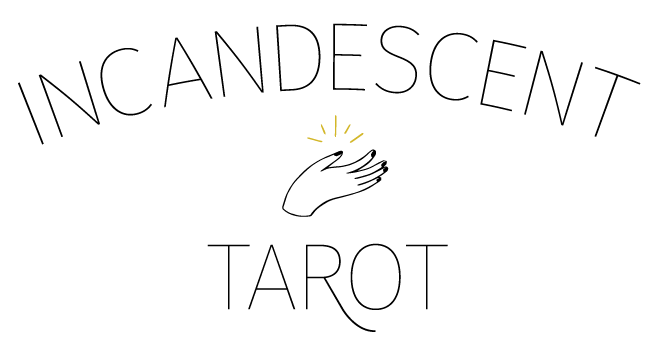





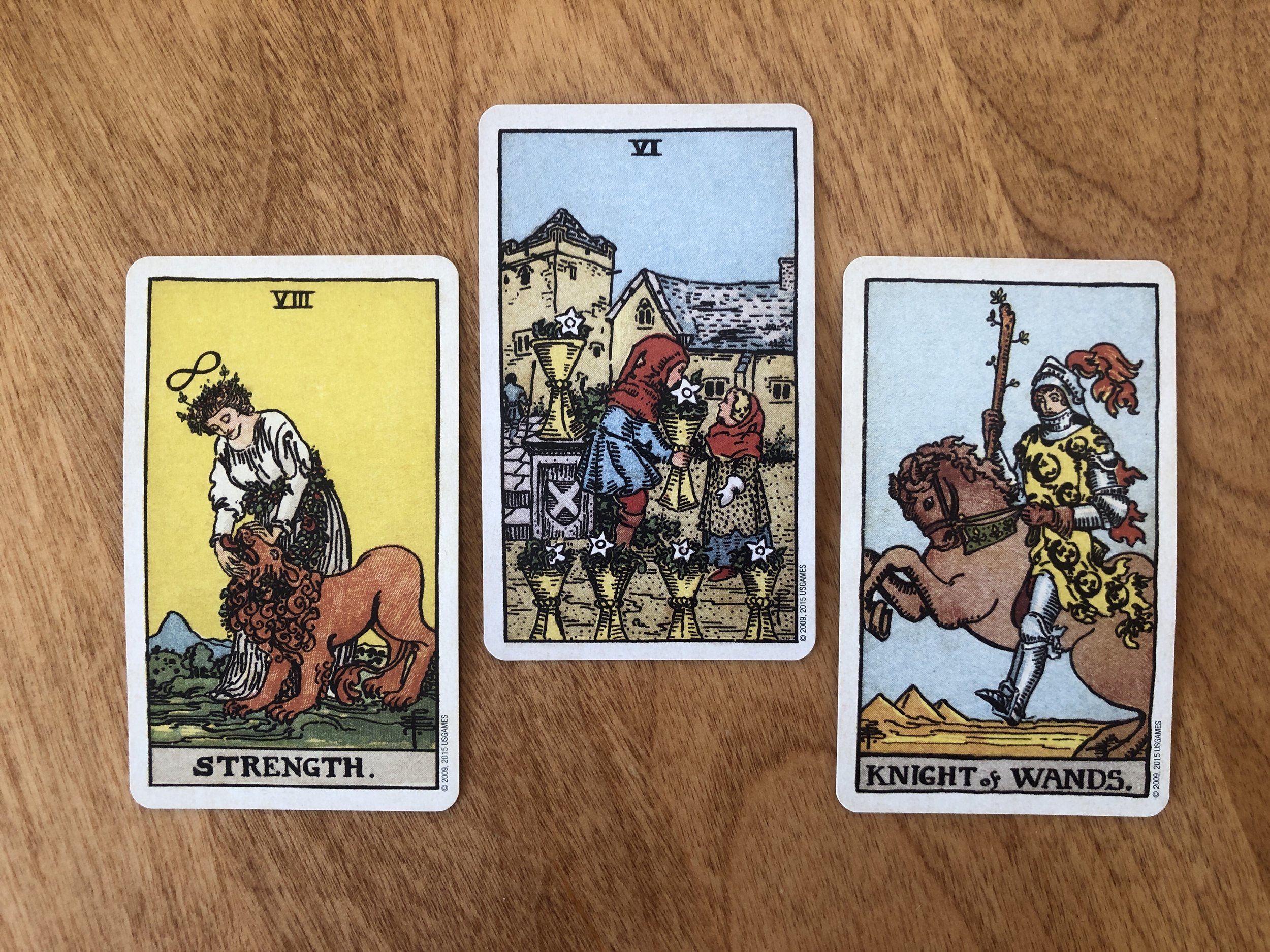
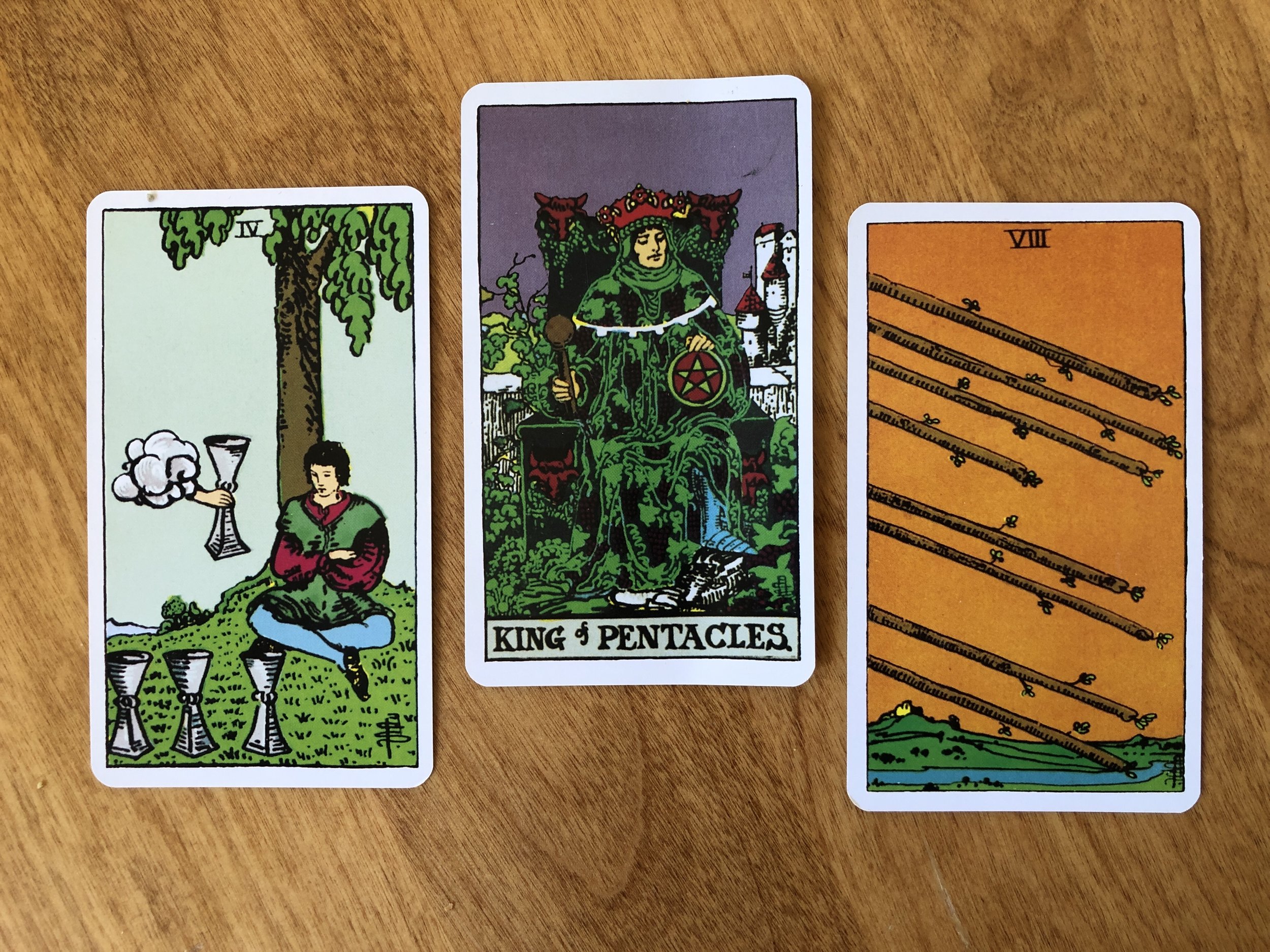






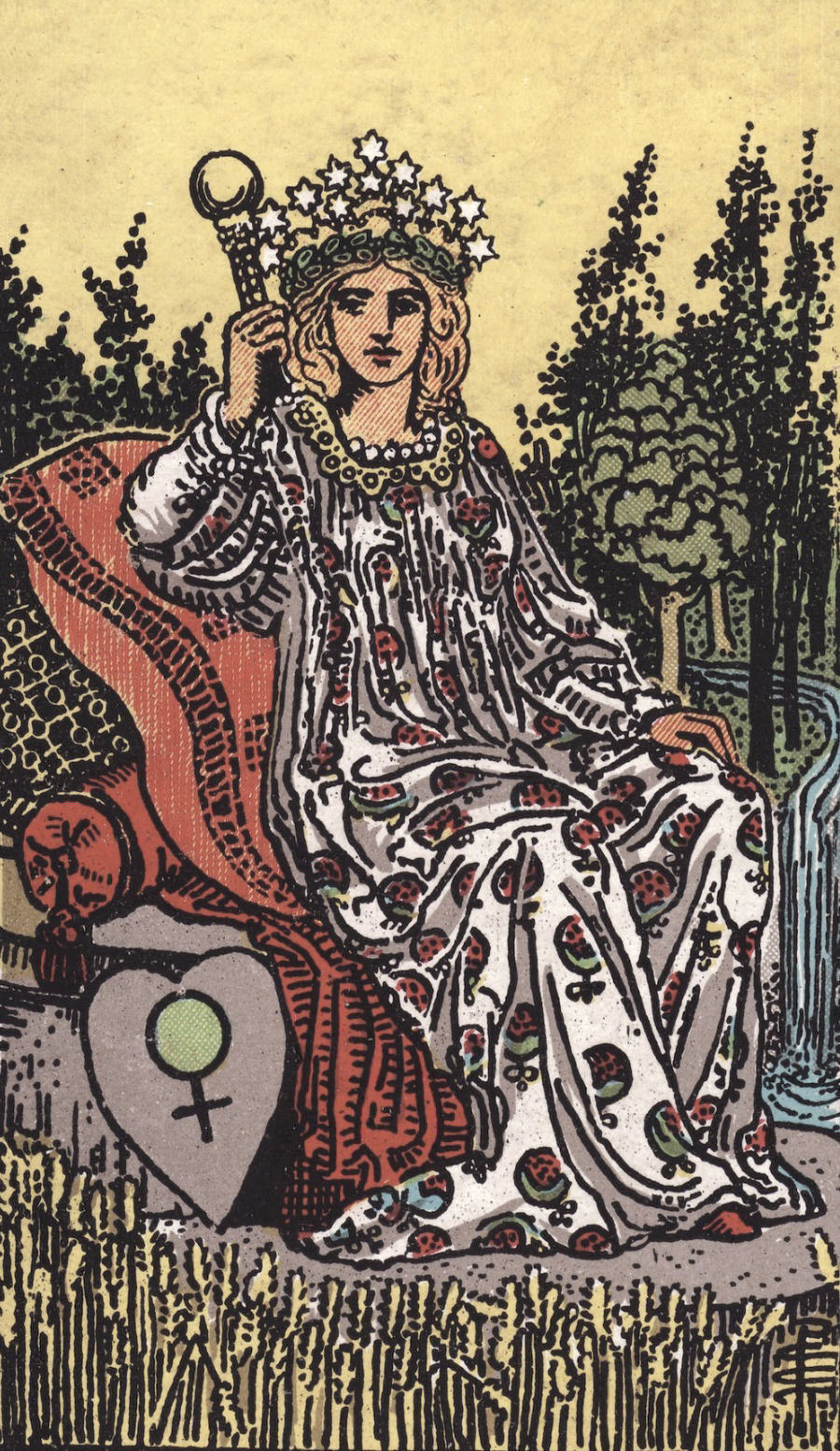
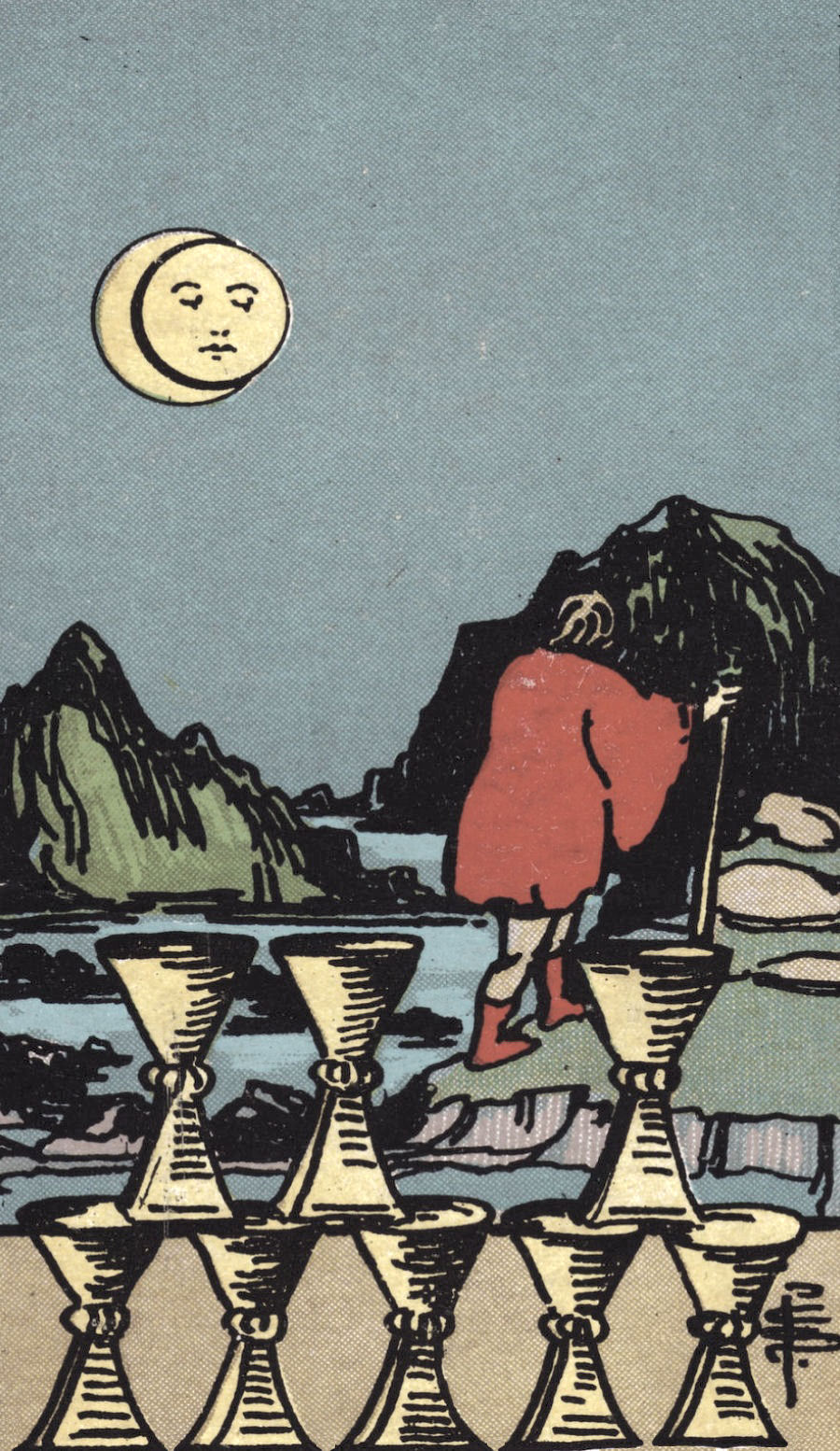
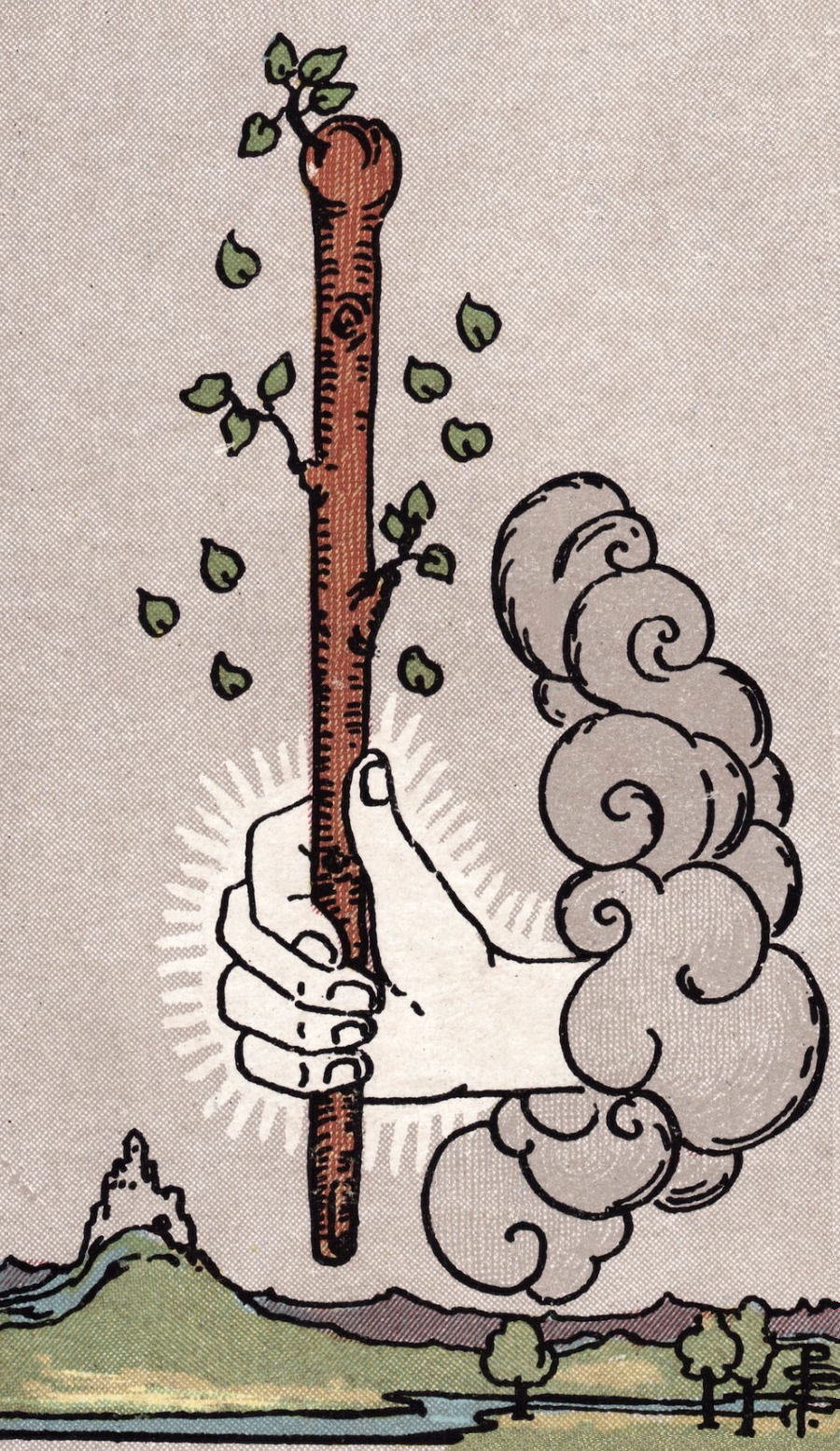
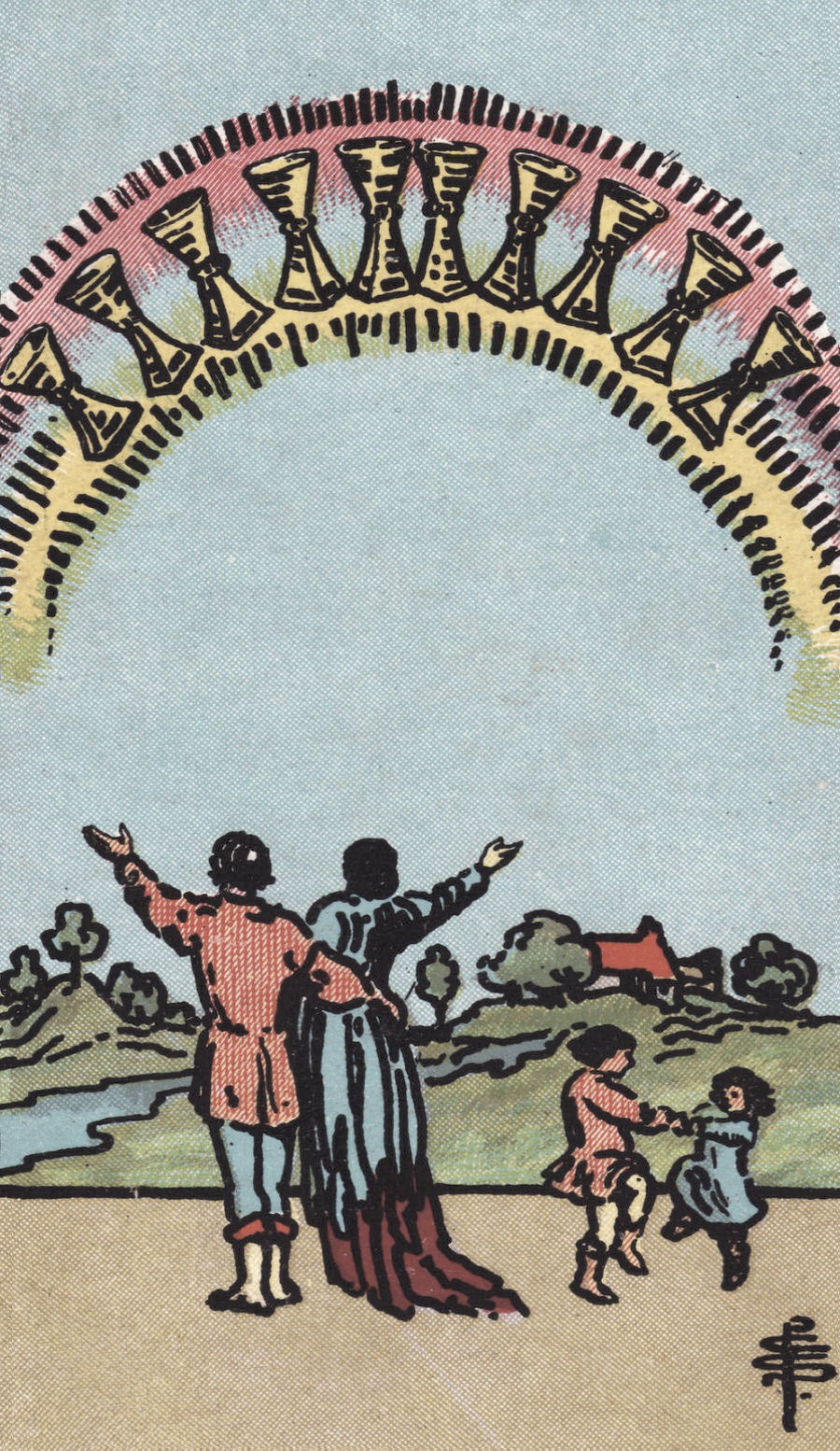
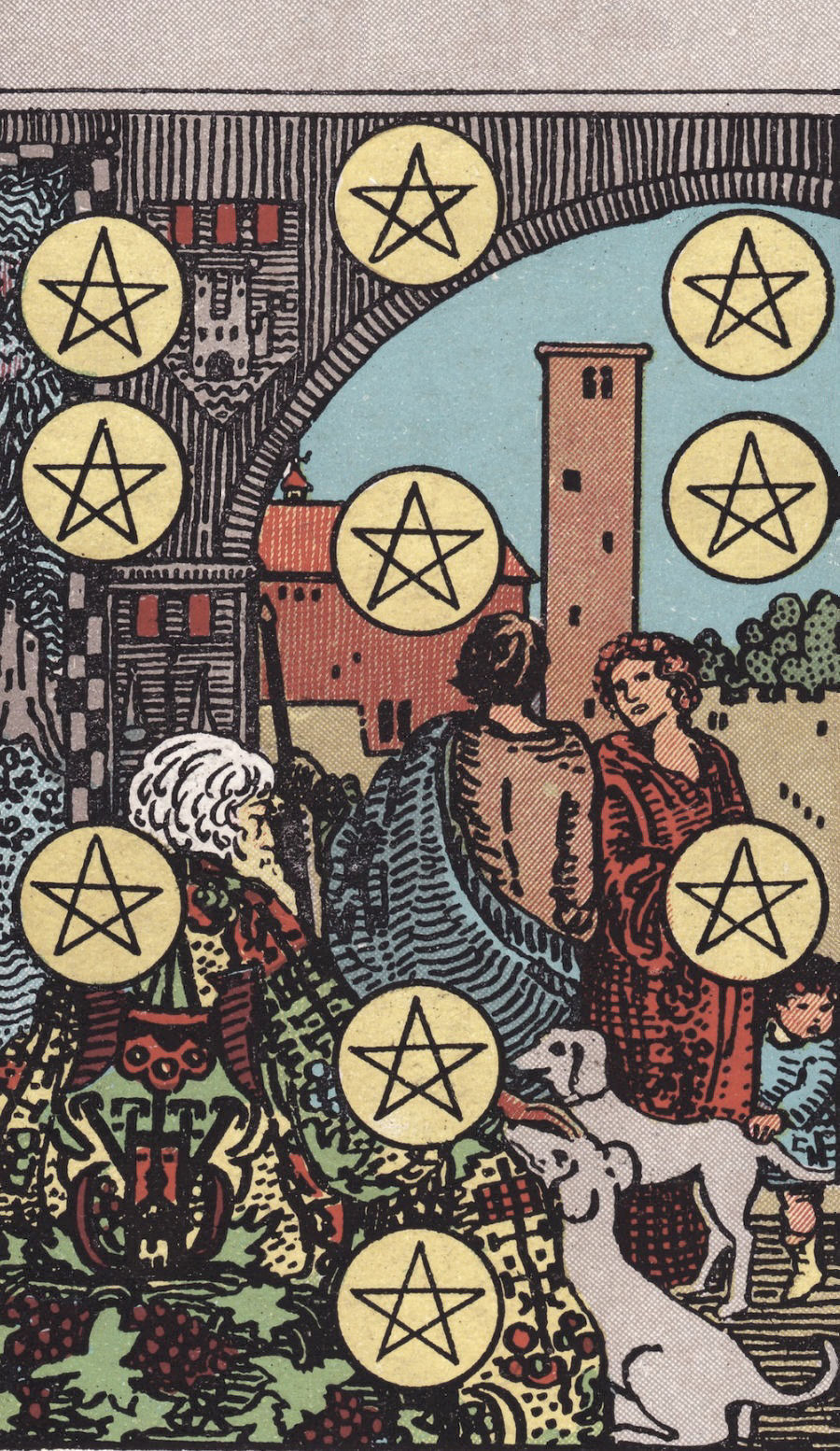
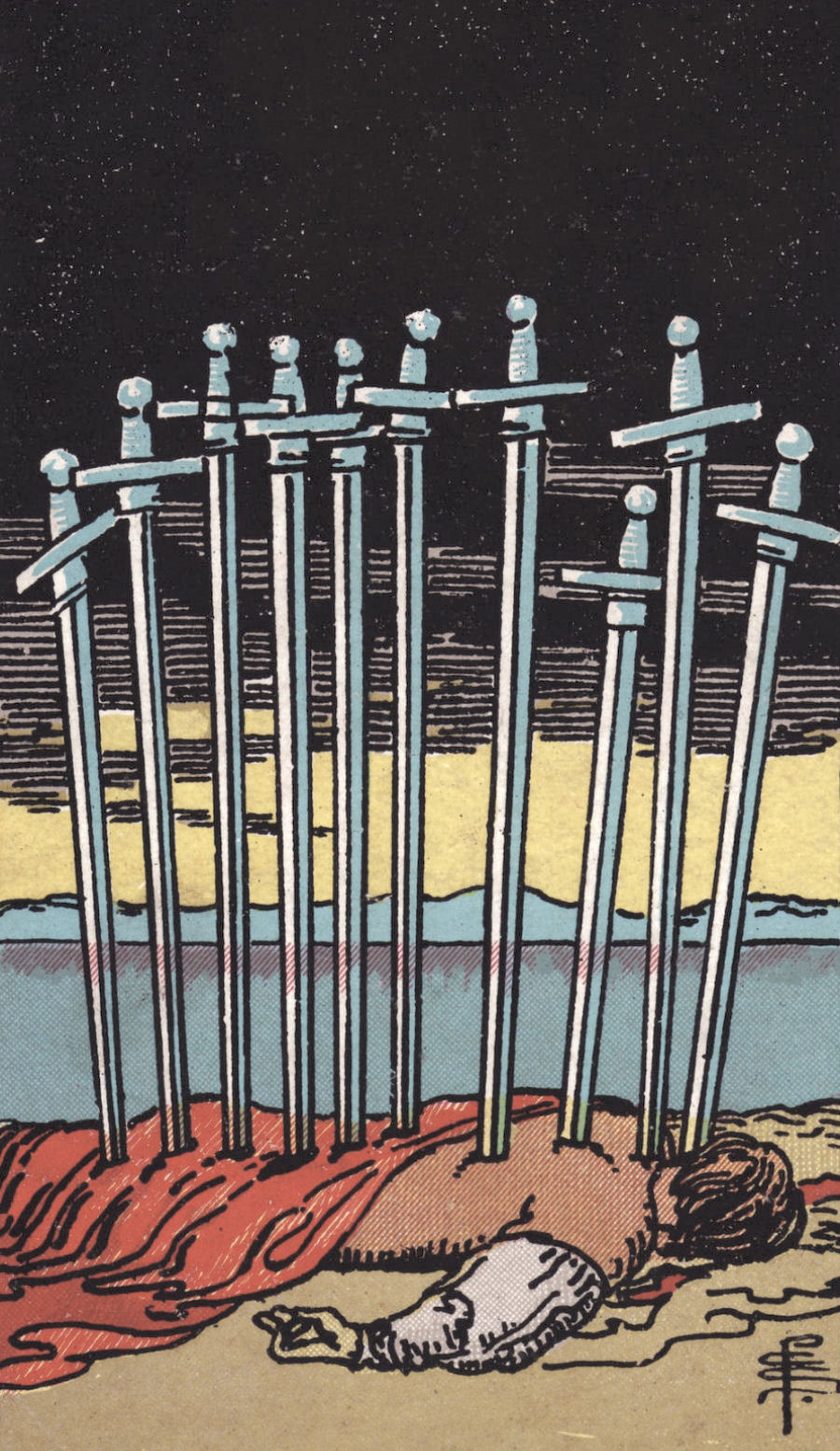
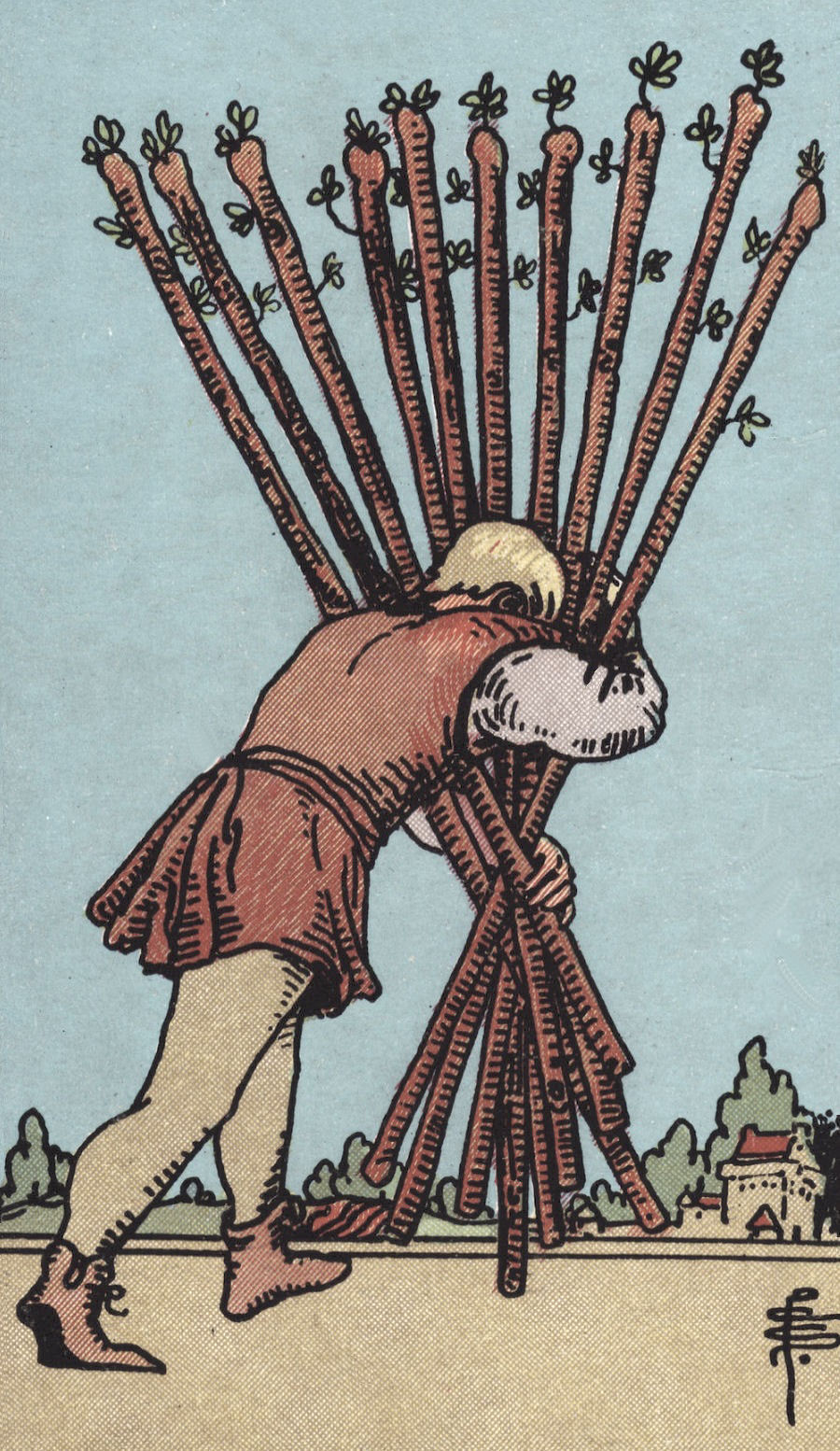



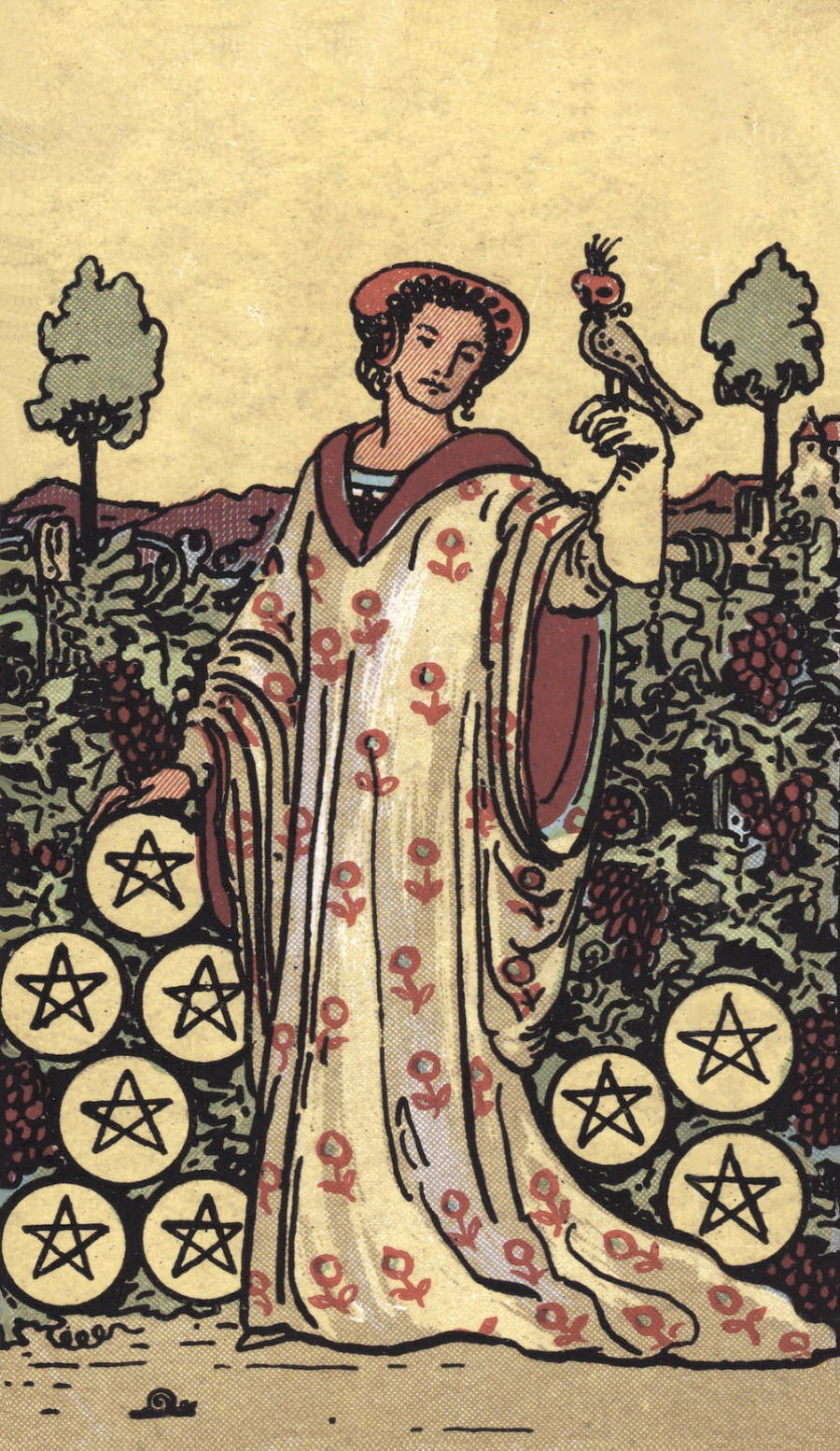
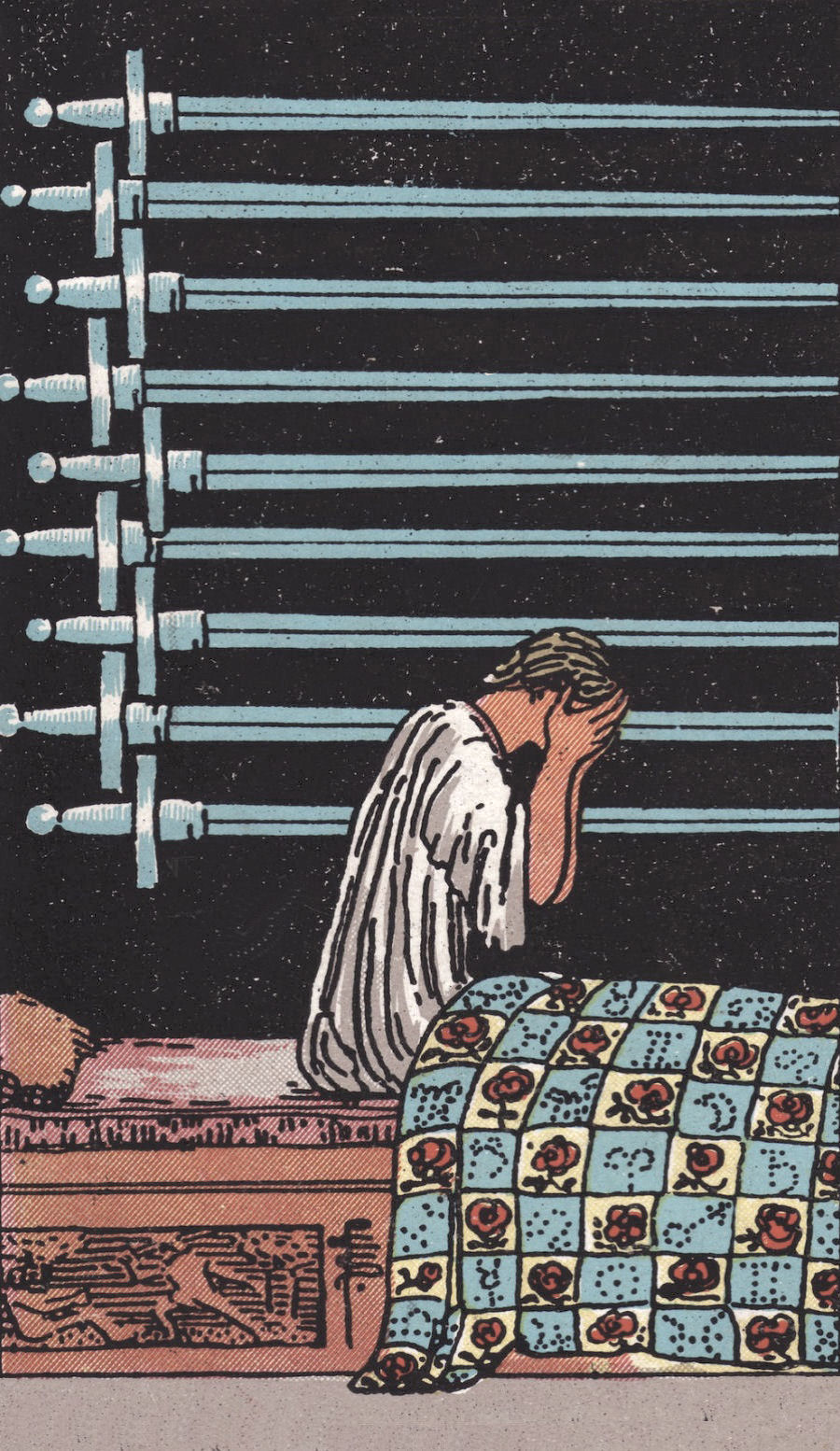
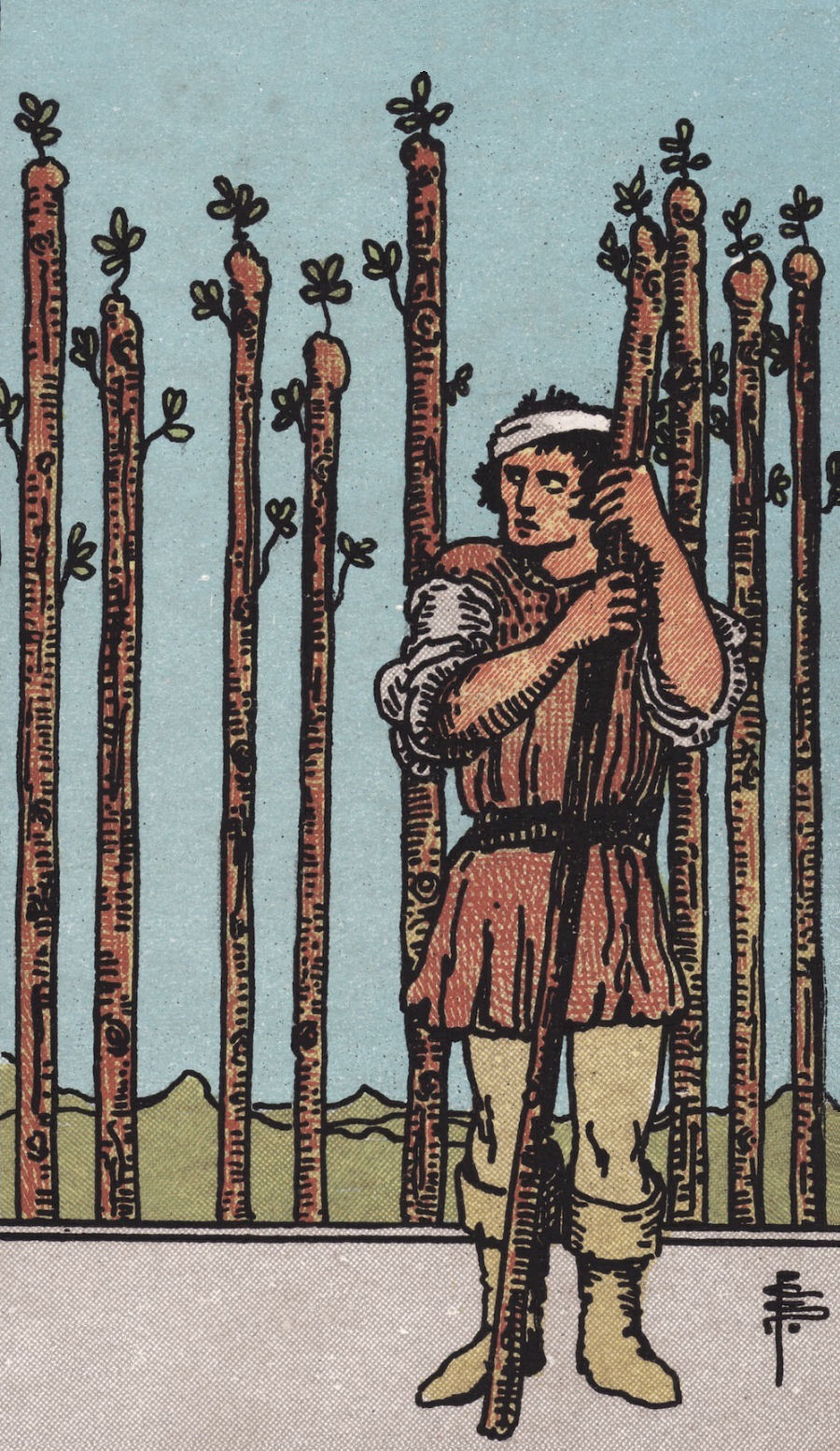

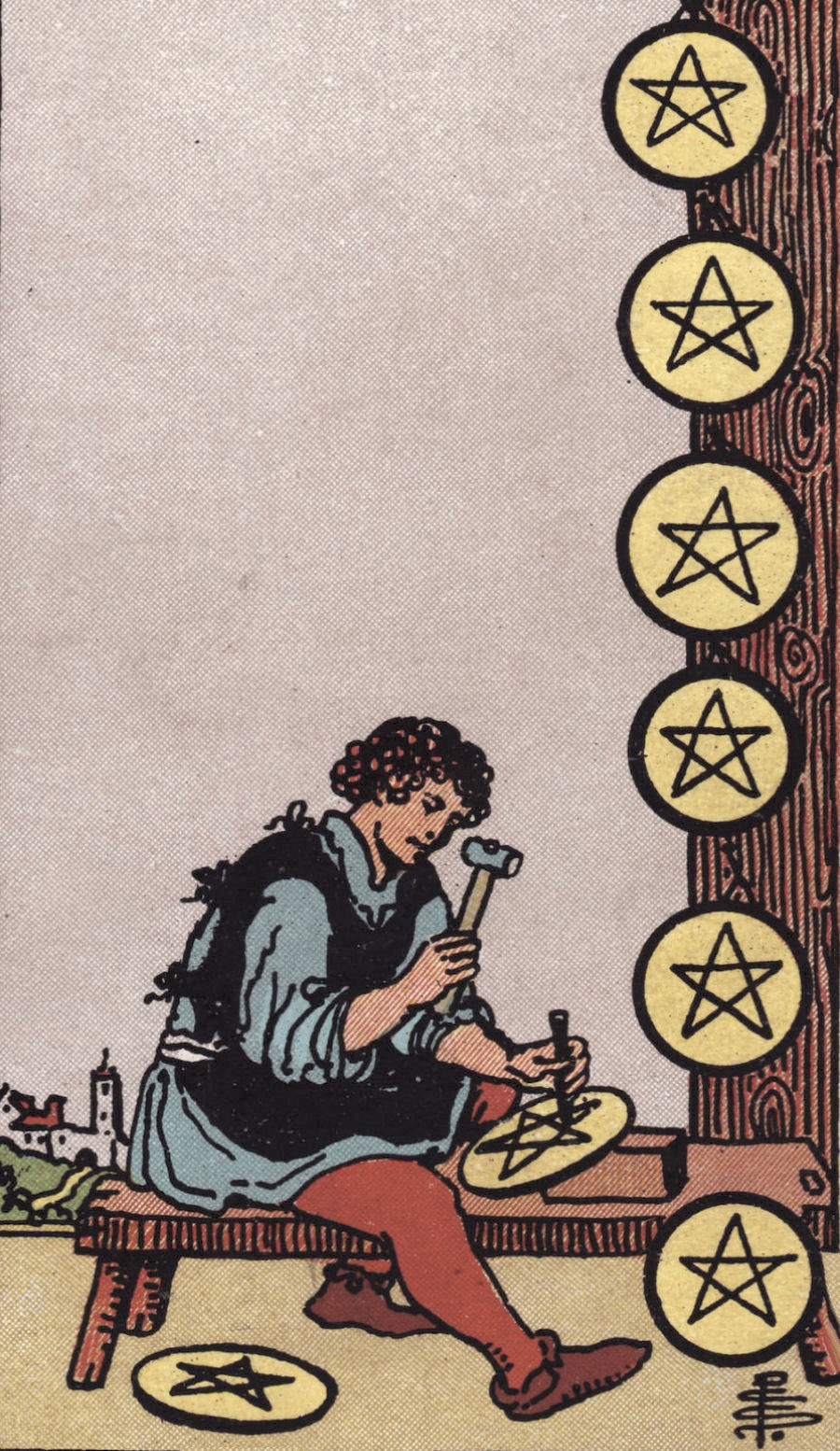
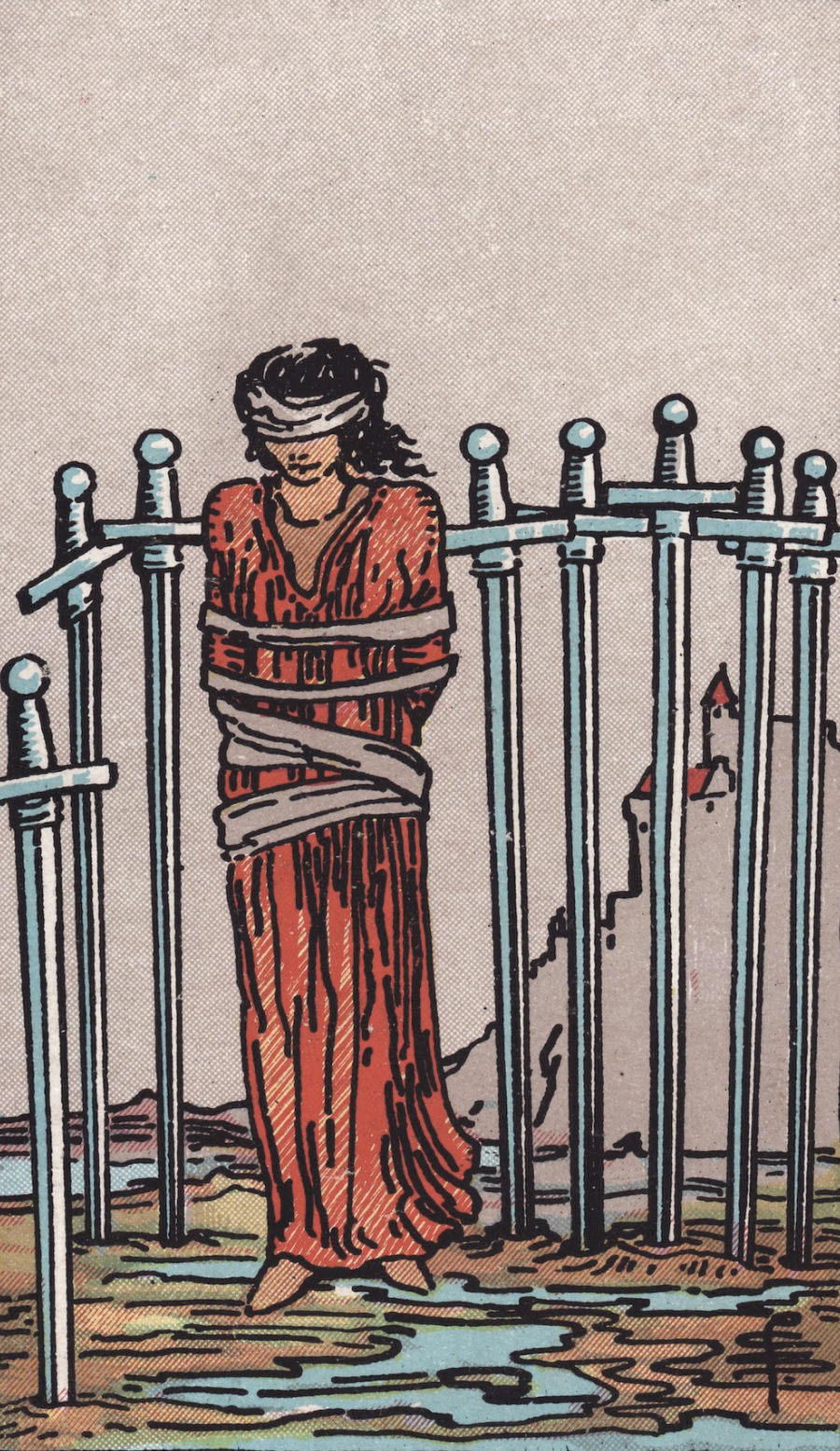
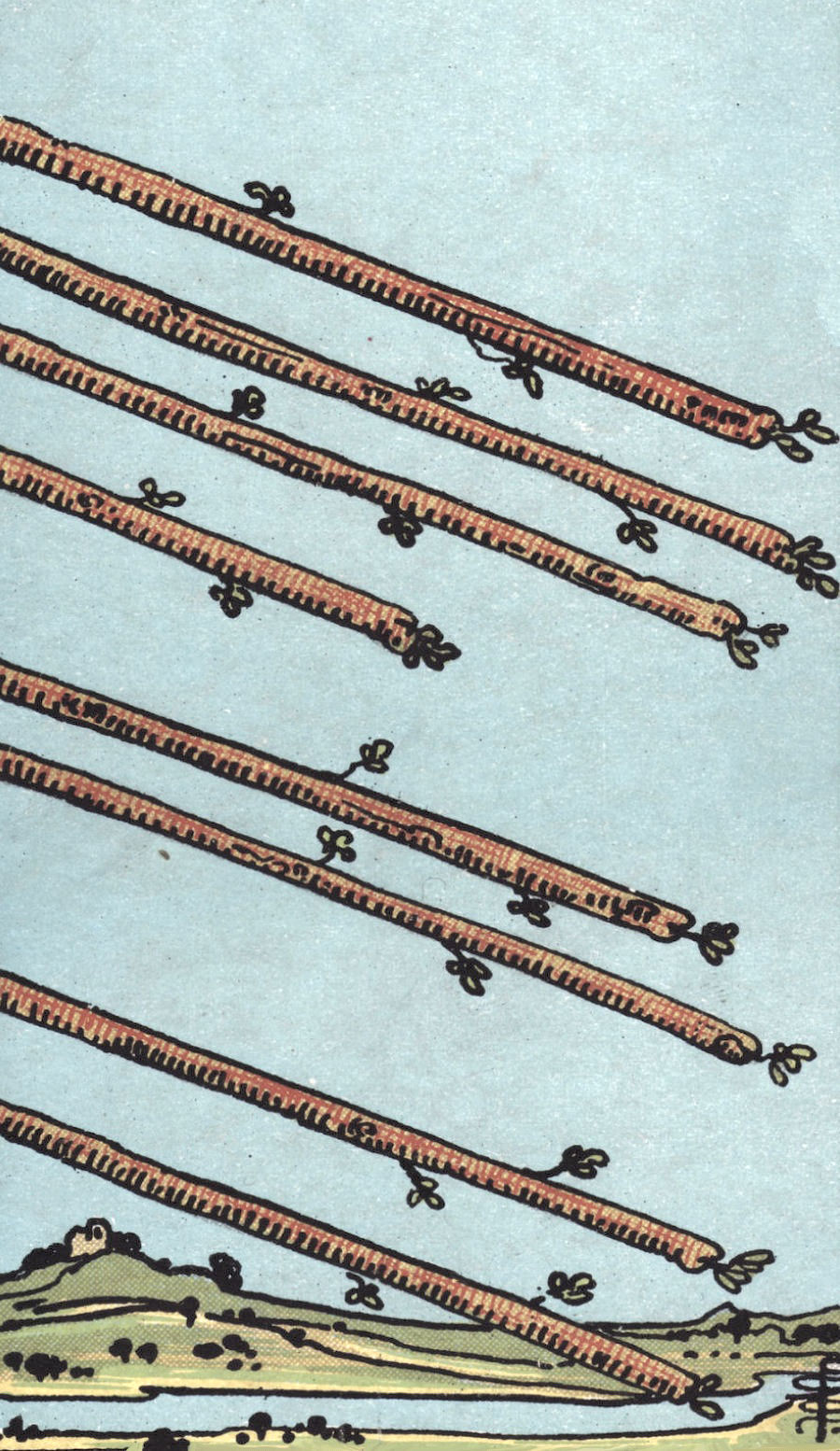
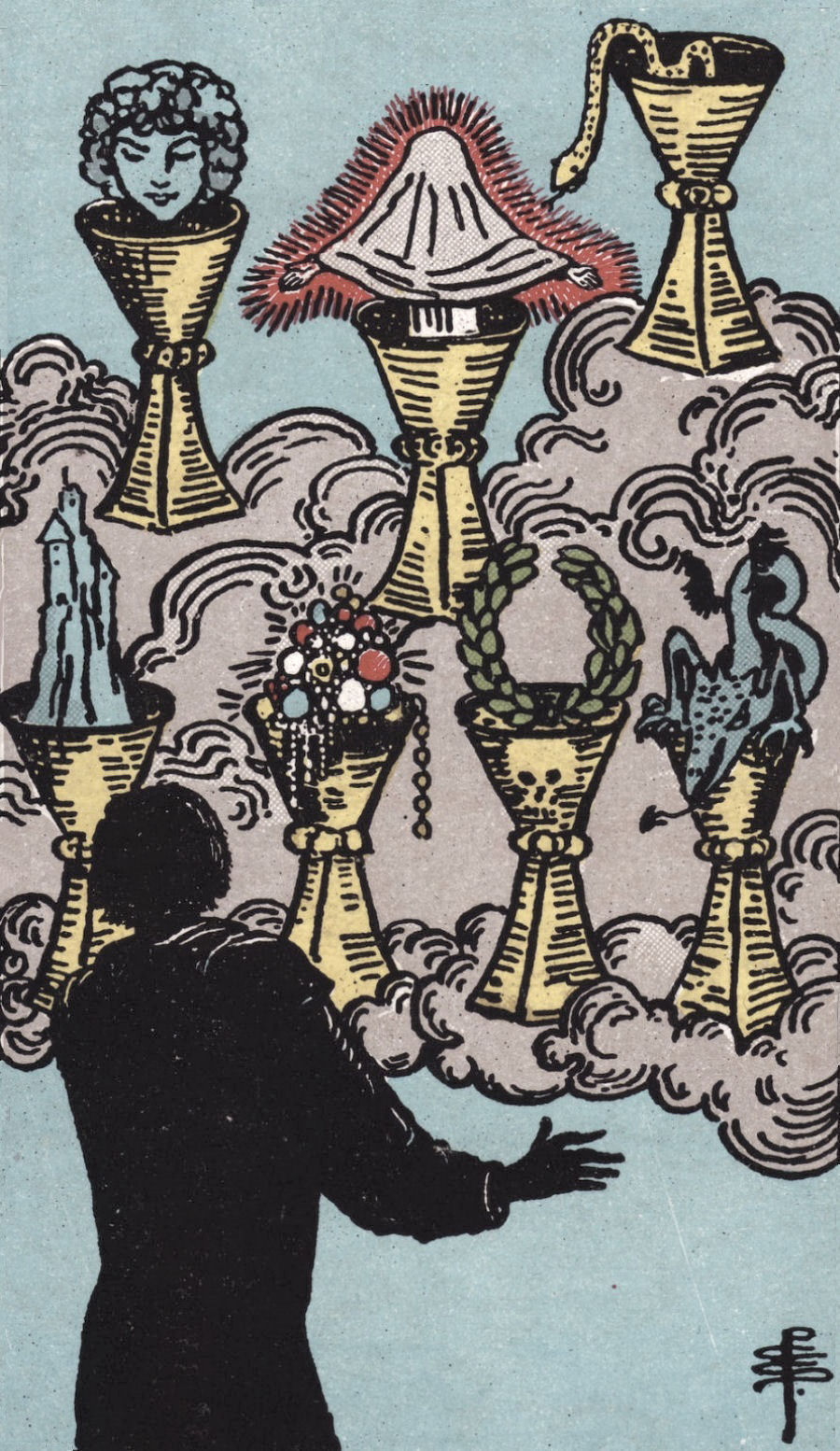
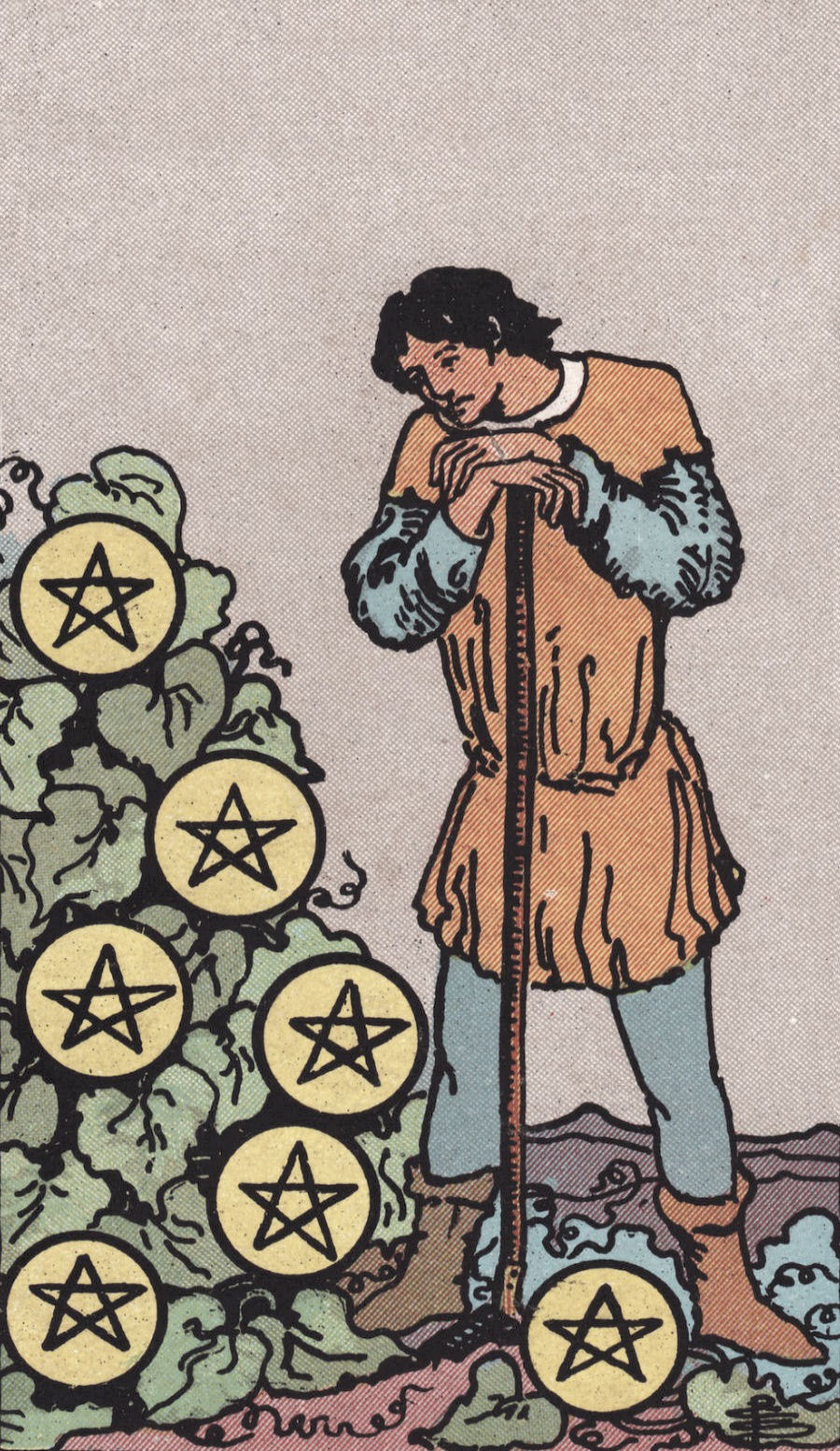
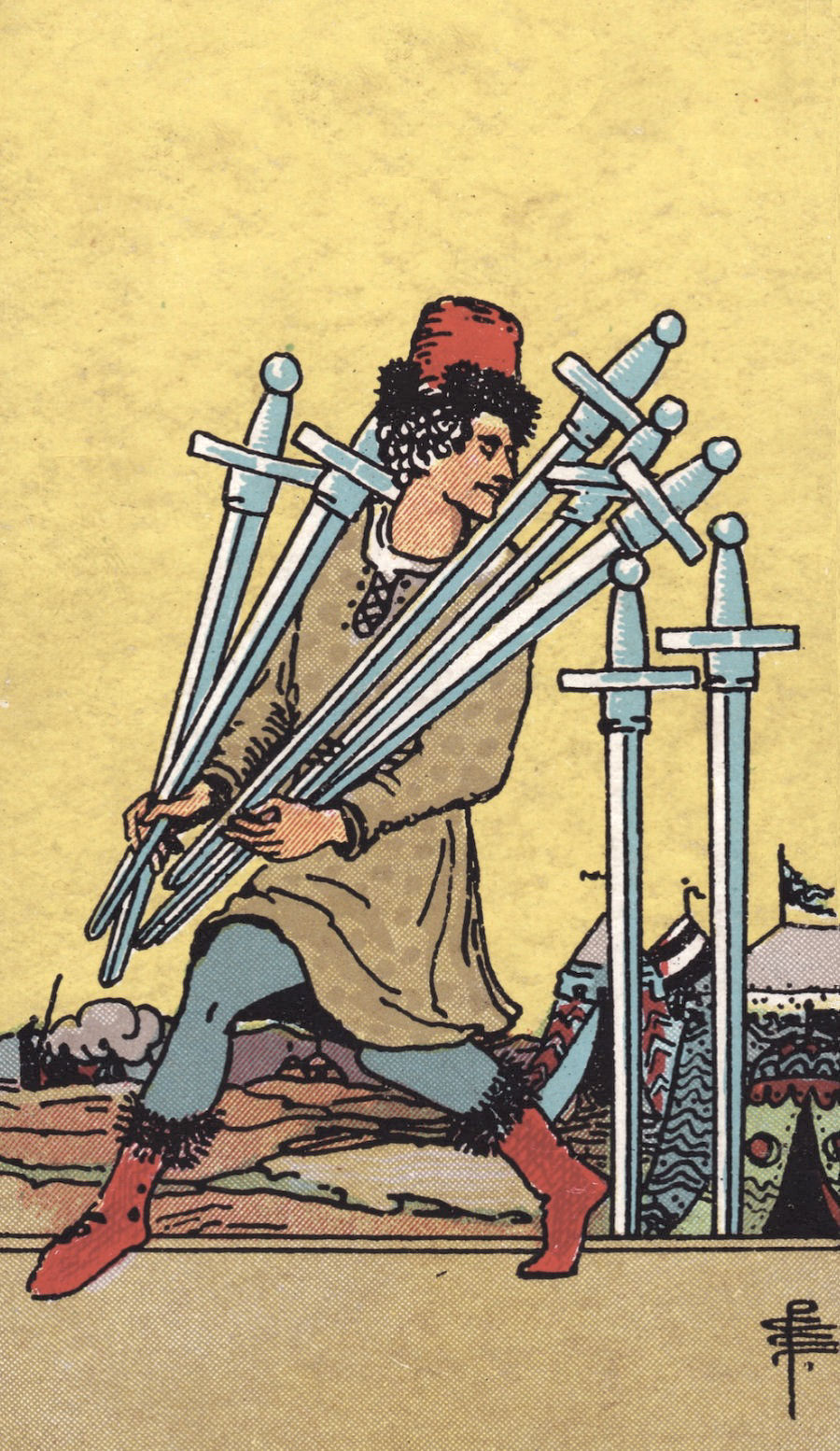
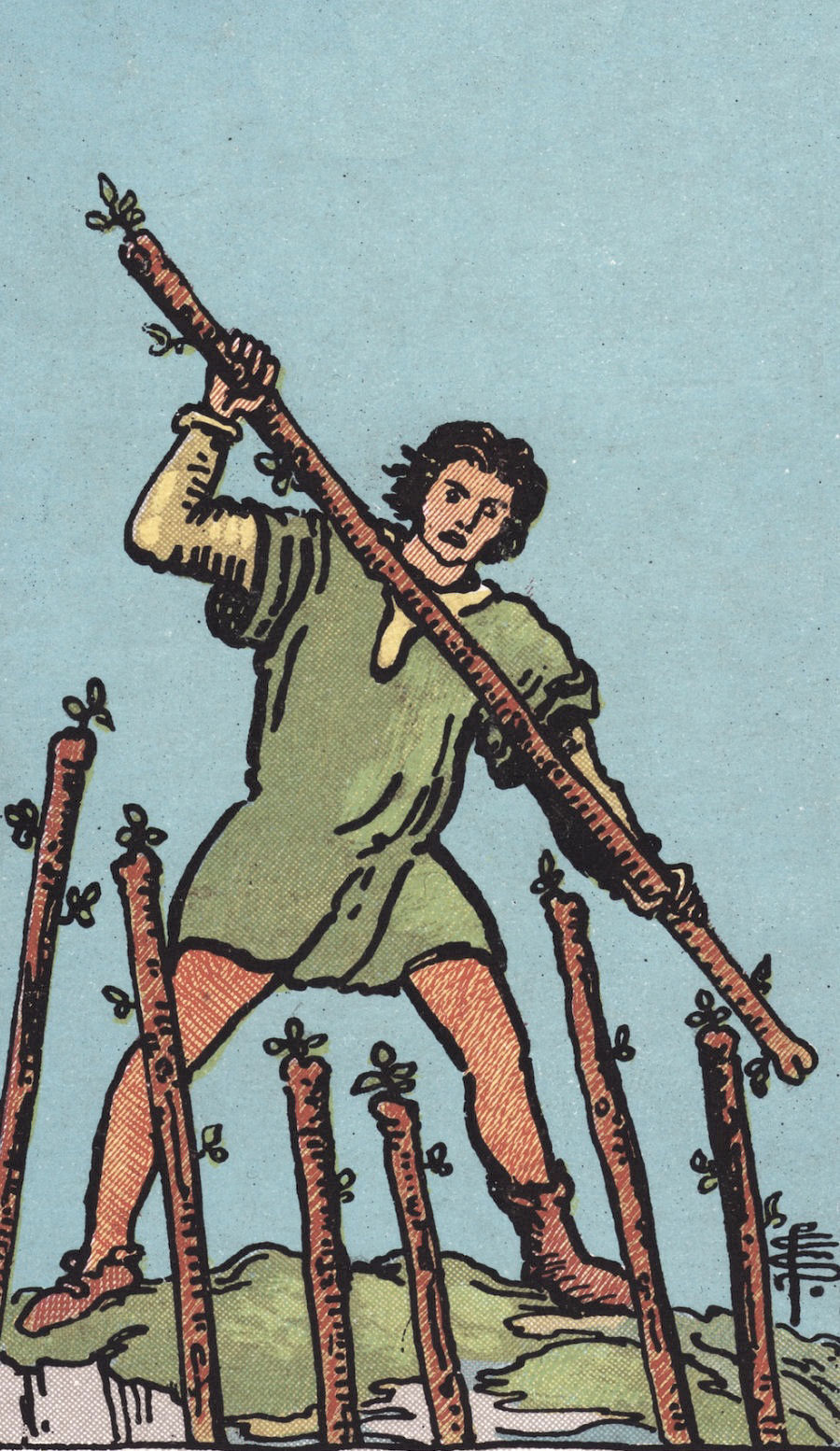
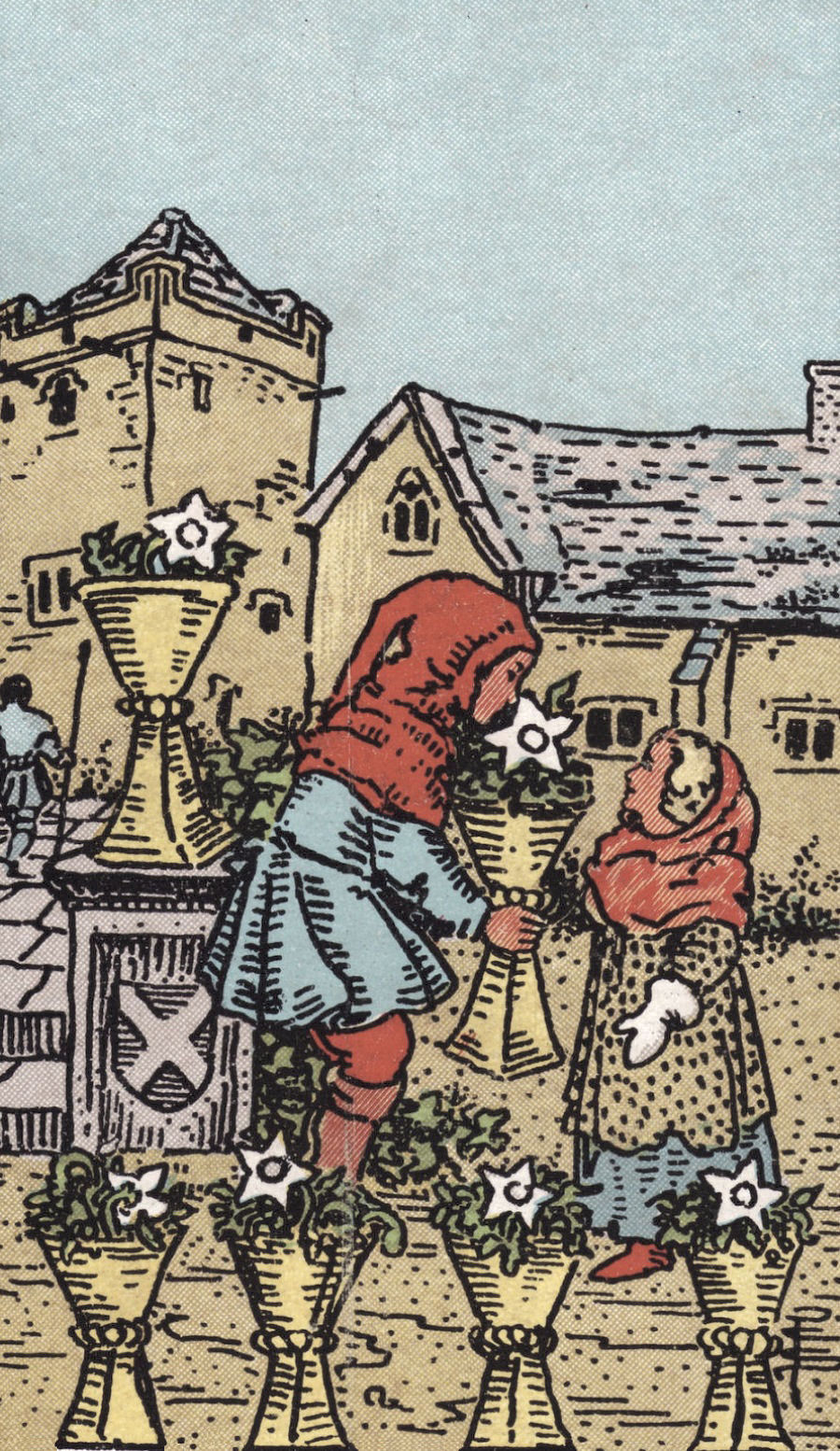
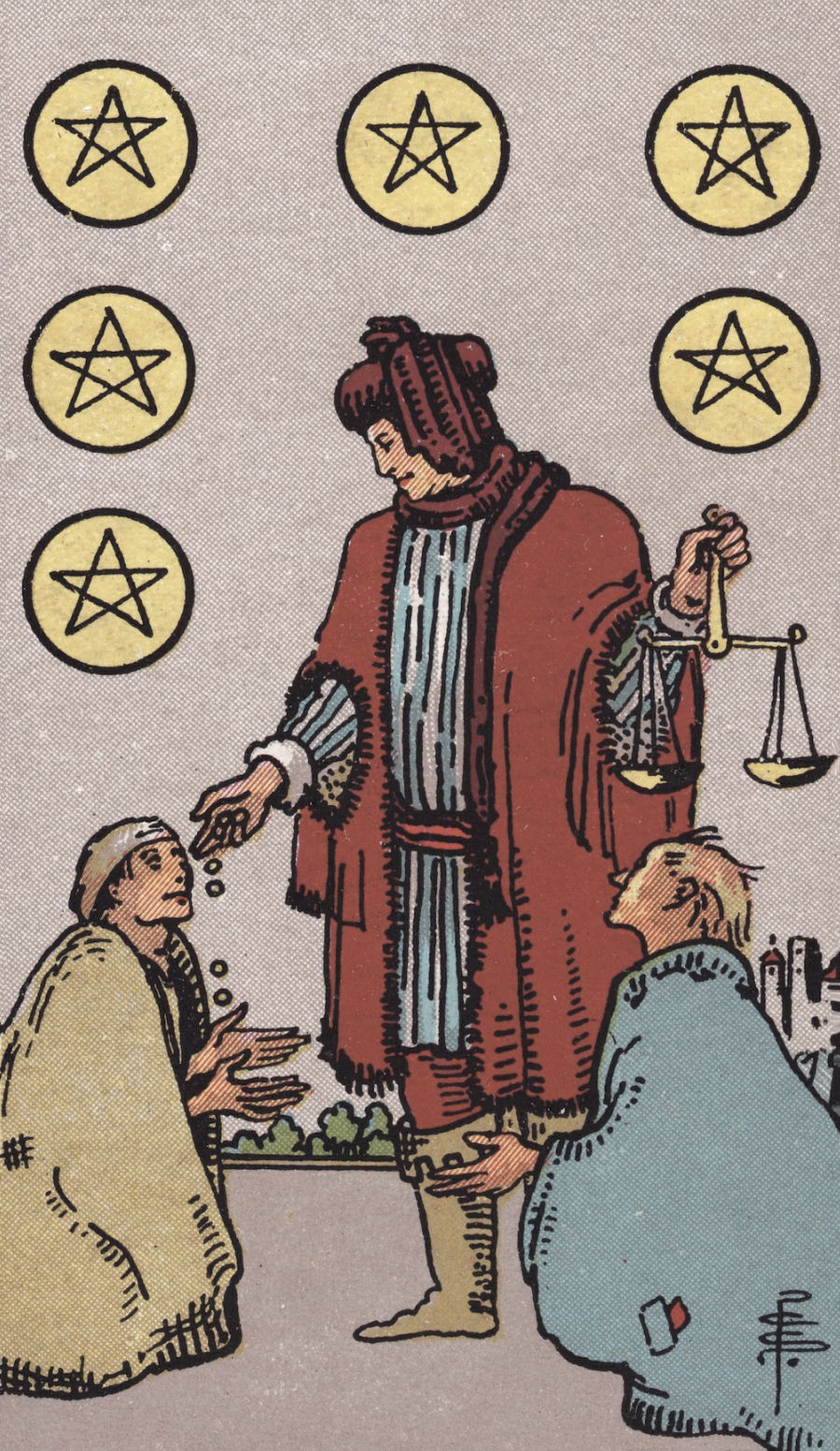
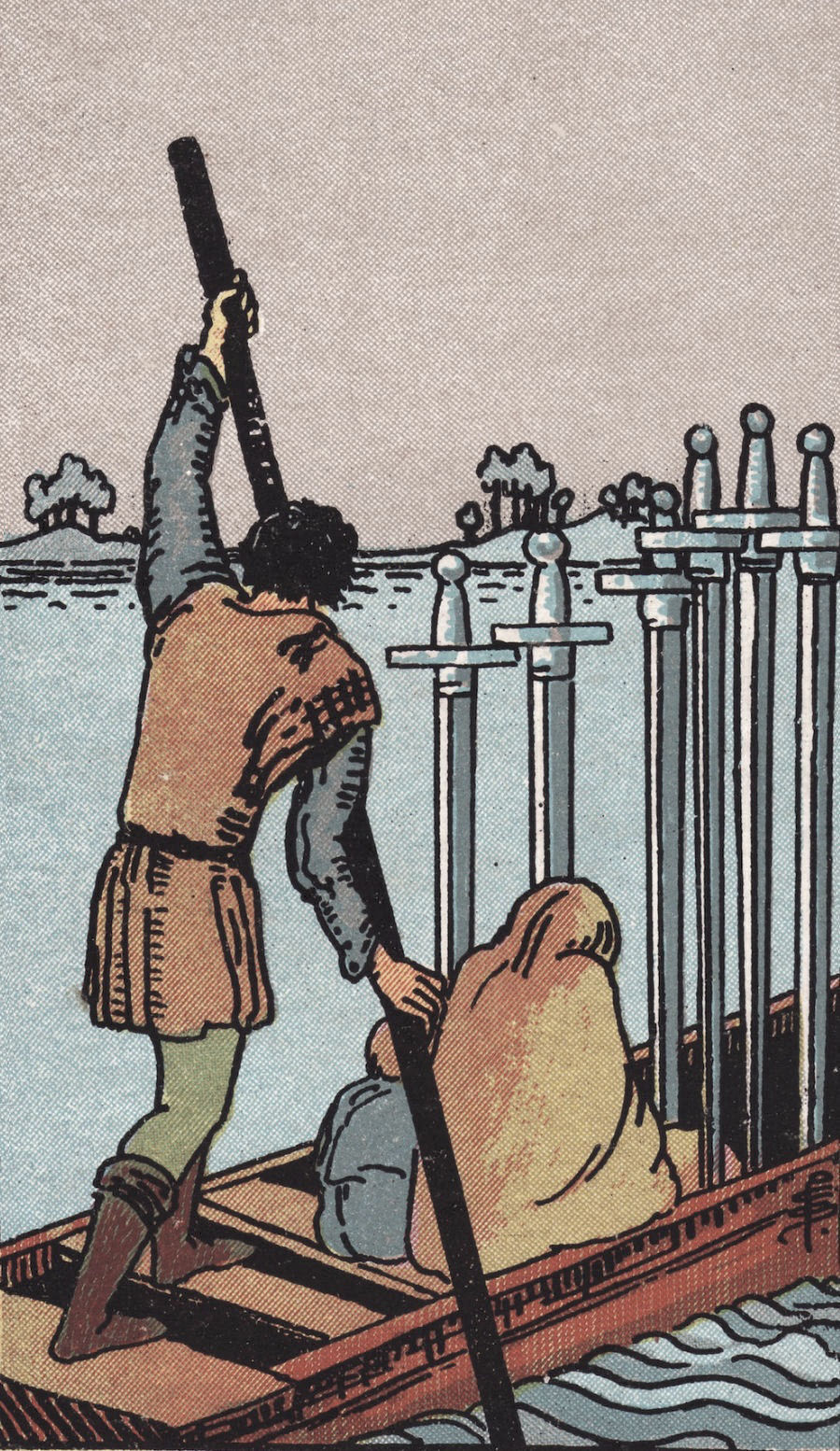
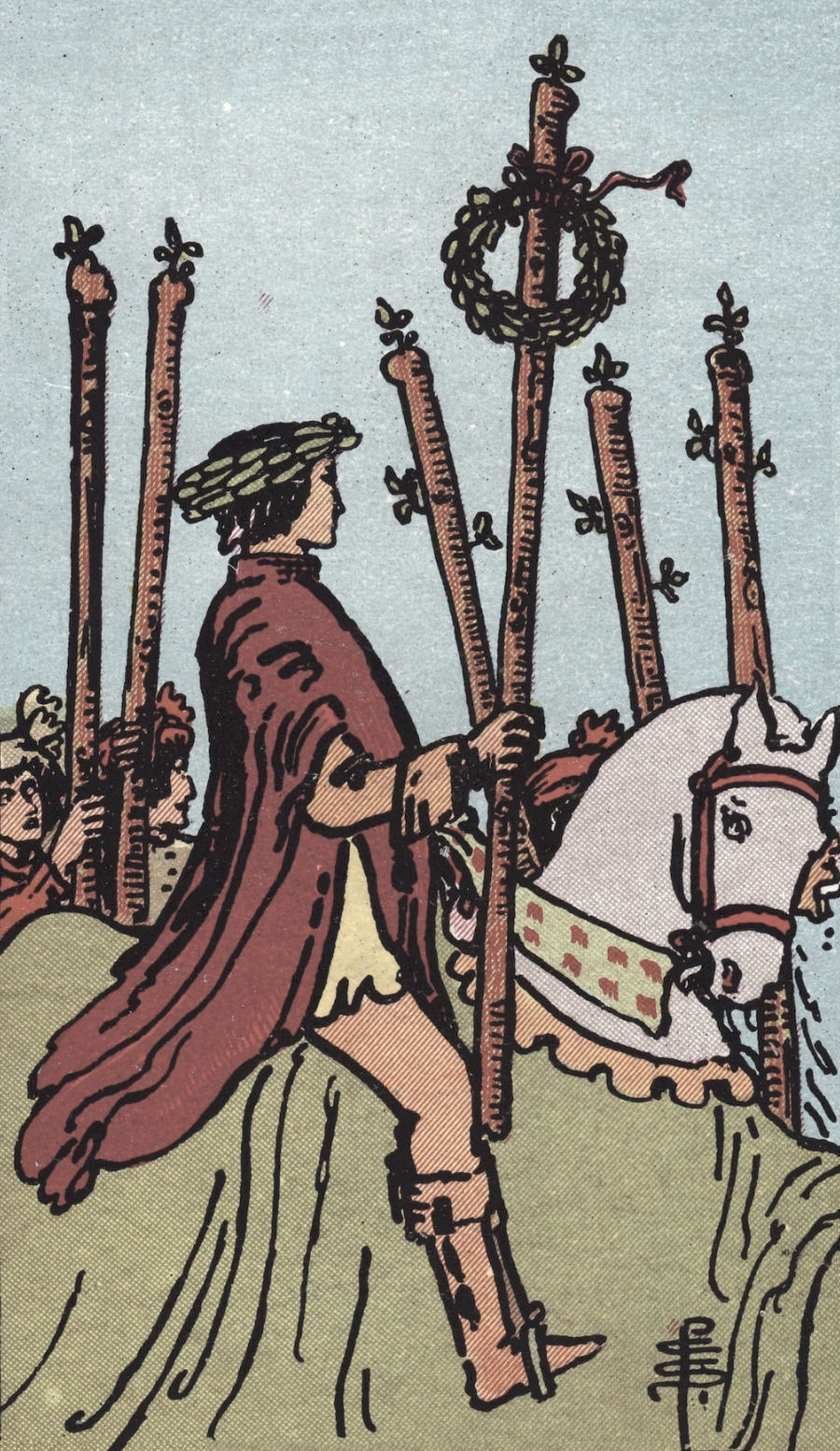
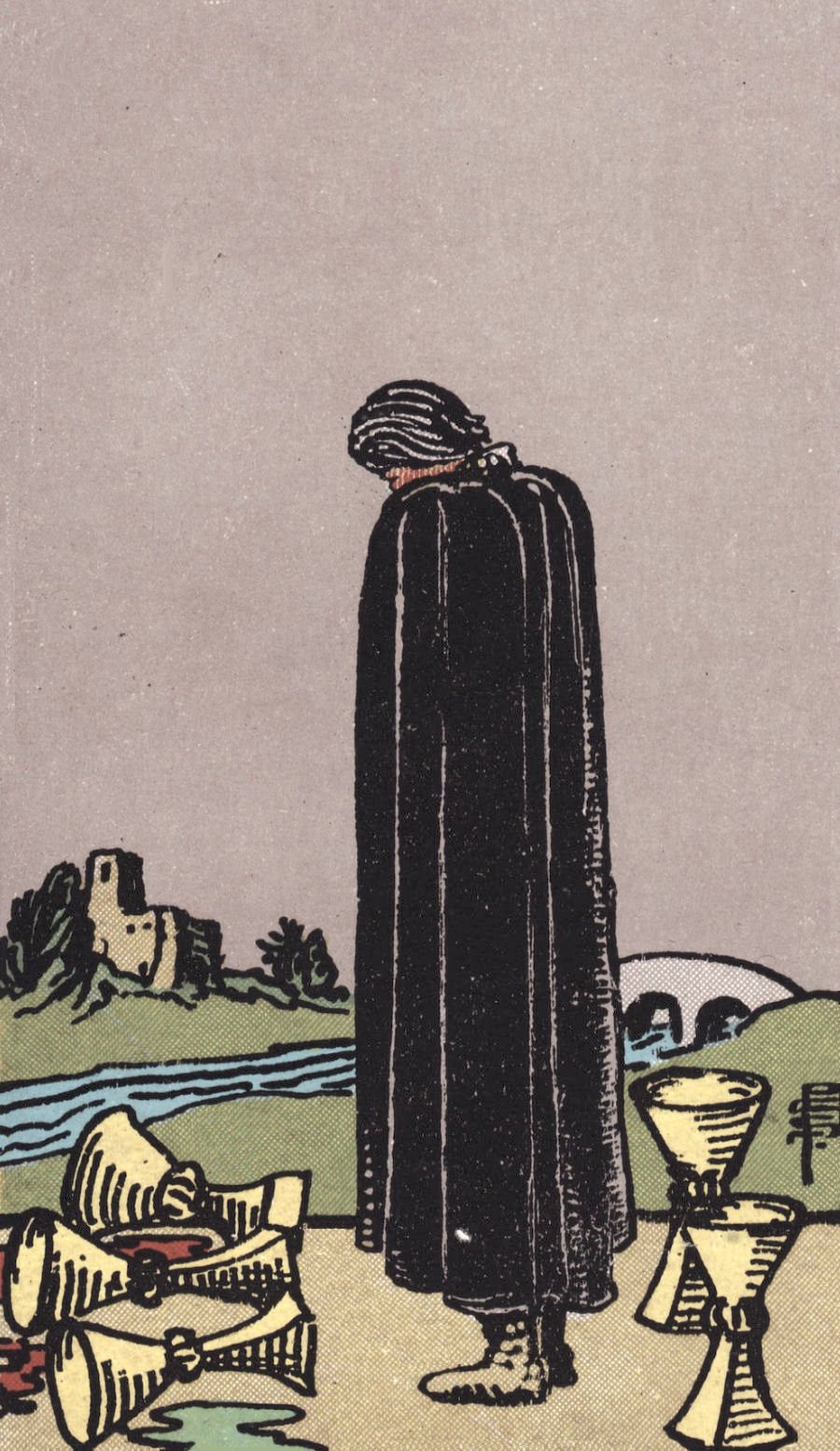
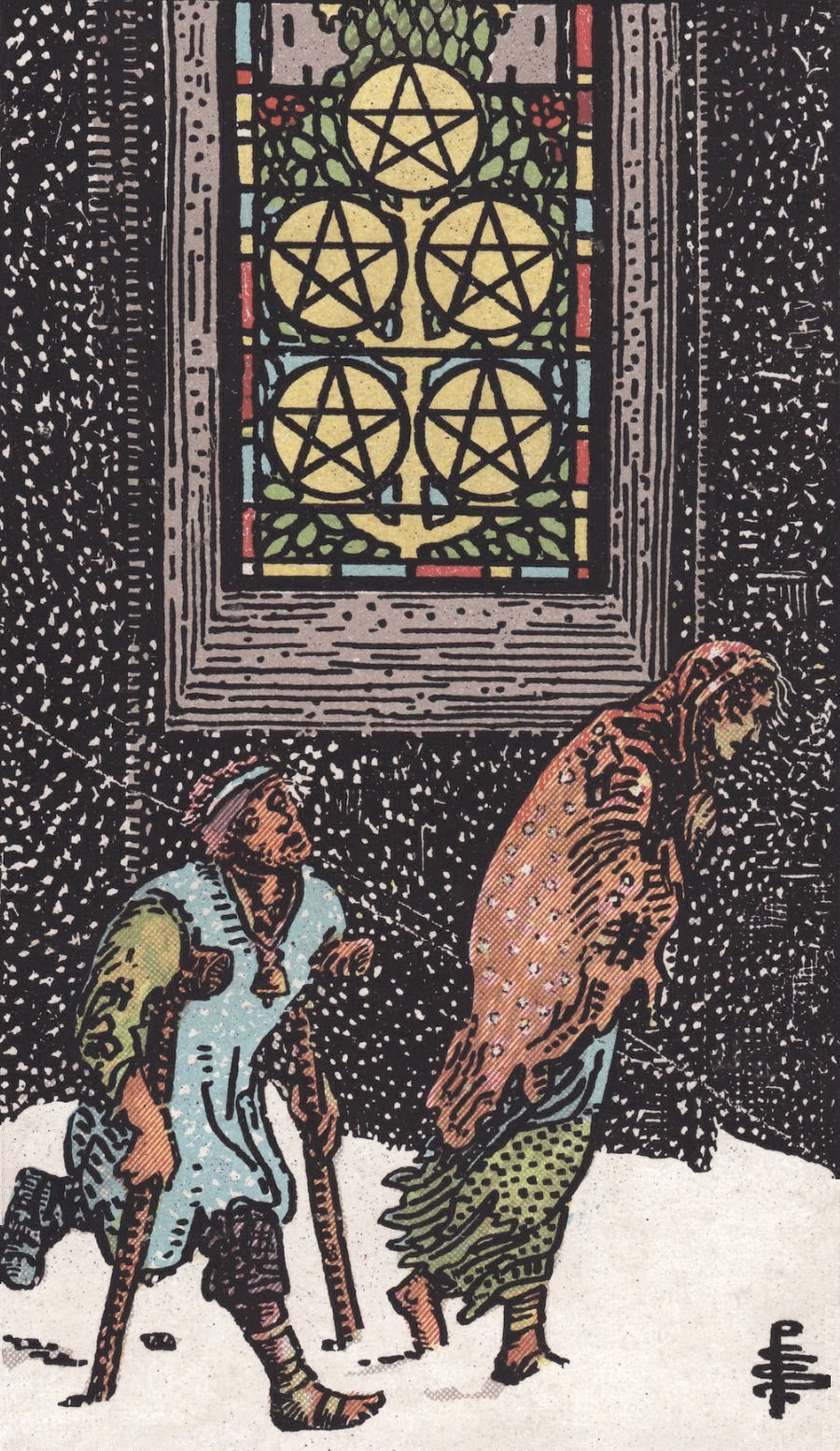
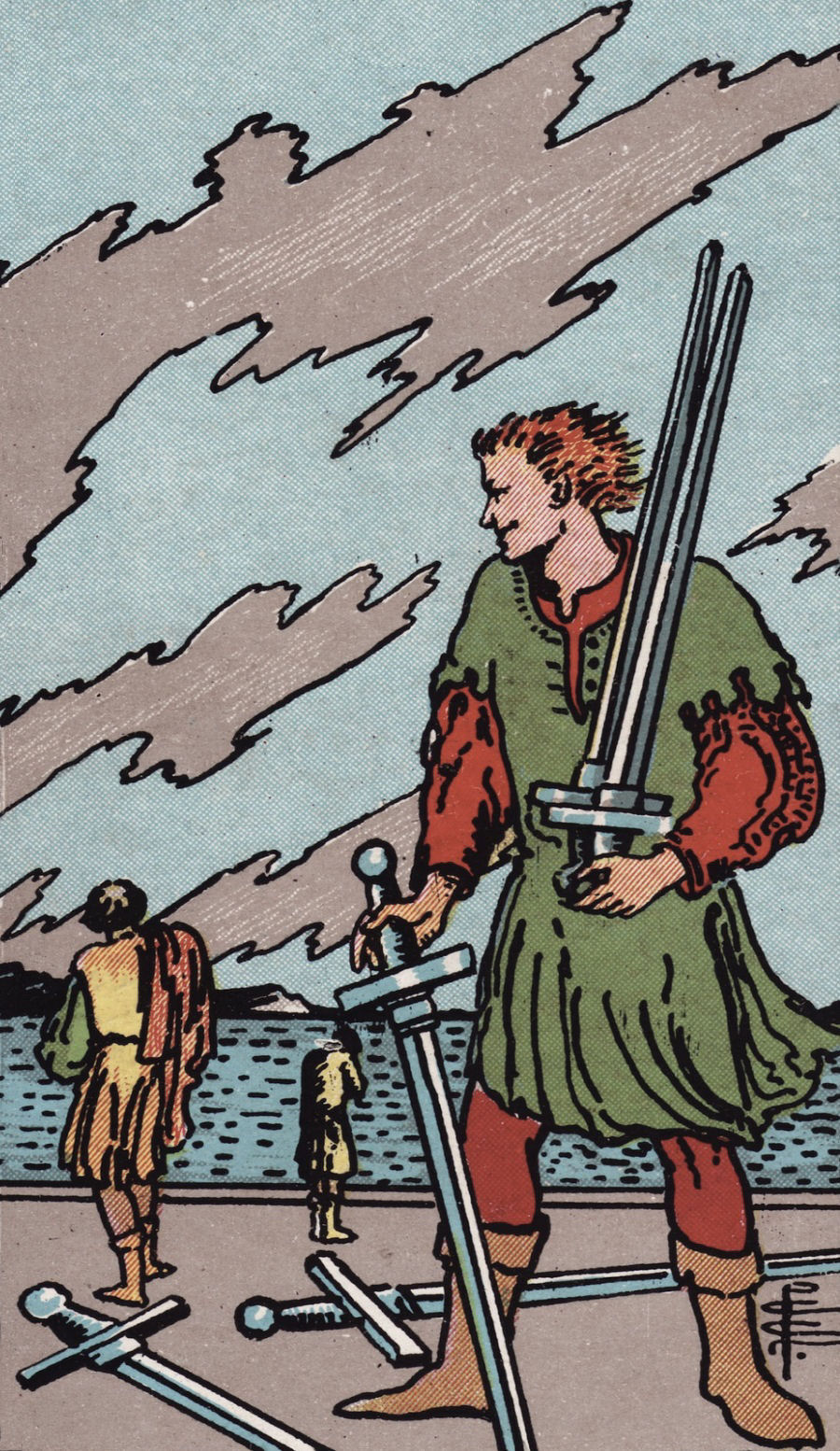
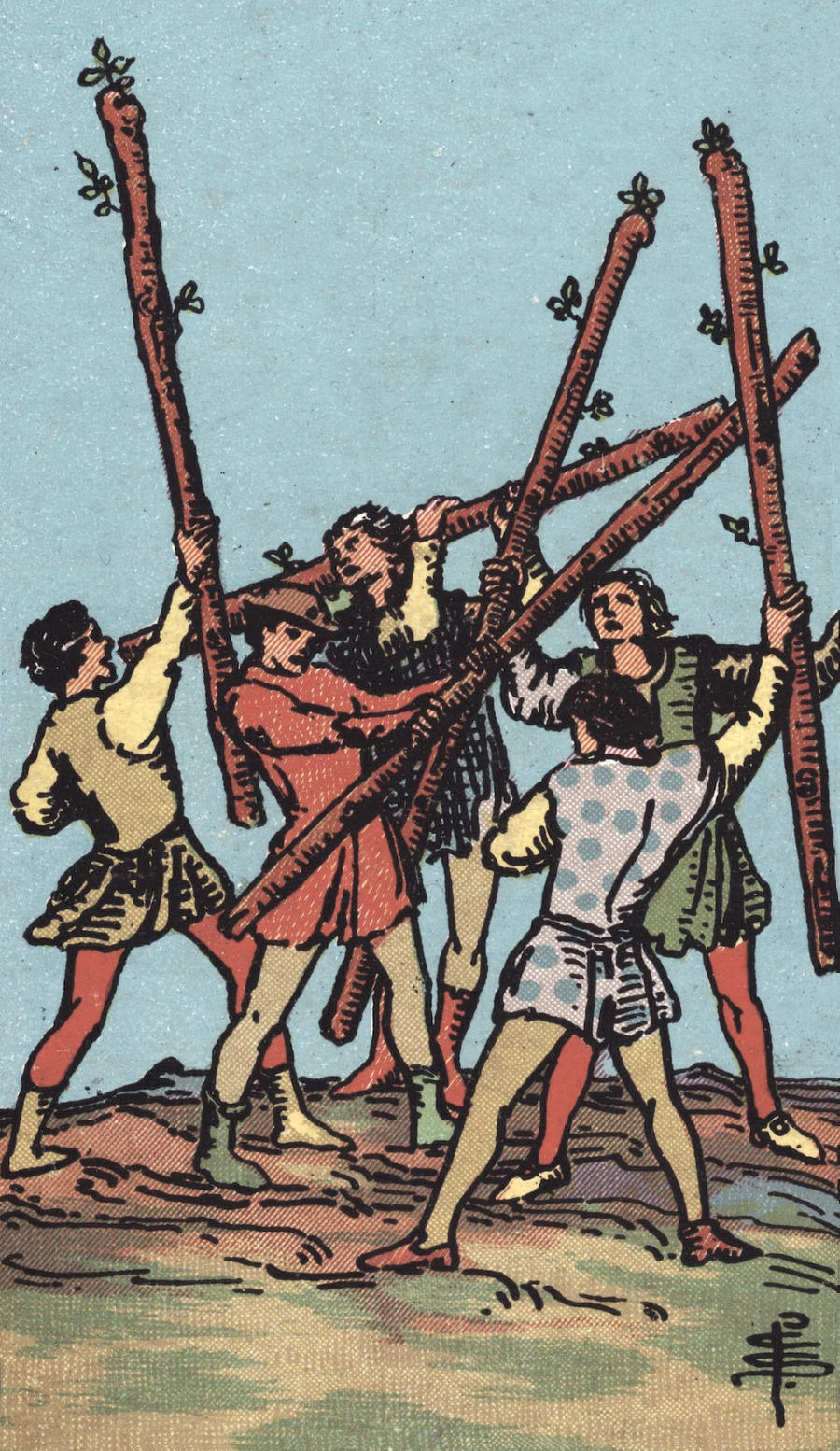
We’re using a different deck than normal this week, for no other reason that that it was the closest to my morning writing spot - nestled in bed under a crisp, white duvet. Our cards have a similar energy, a focus on finding comfort and rest in difficult situations. Because, as you’ve likely noticed, The Tower is starting things off this week. What’s crumbling or has crumbled recently? What is making you tired?